#His explanation would include a flashback to this scene
Text
Yo remember this guy?

What if they’re how the main cast fix Wukong’s scroll piece?
Like so far I’ve been thinking that they’re the villain behind the scenes, the one pulling the strings to follow through with some master plan, and I still think they’re gonna turn out to be evil and who’s manipulating events.
But they’re also our only possible lead on how the gang are going to fix Wukong’s scroll piece, mainly because they seem to have some sort of knowledge of the scroll, having been able to access it. Thus, they might be someone that the main cast goes to in order to fix Wukong’s scroll piece. That, or they pop up out of the shadows offering their aid.
But yeah it definitely seems like they’re gonna be the way that the gang mend Wukong’s scroll piece so they can free him again.
#That or they’re actually just Wukong when he went to supposedly steal the scroll from the underworld for some good ol’ nostalgia#If they are Wukong I’d imagine that once he’s freed from the scroll piece and the gang ask him for an explanation#His explanation would include a flashback to this scene#But with his face visible from under the shadow of the hood#I actually really like this theory#It makes me feel smart#But yeah#Either this mysterious character is our secret villain and/or how the gang fix Wukong’s scroll piece#Or they’re just Wukong when he went to steal the scroll from the underworld#If they are the villain of the season maybe the reason they released Azure Lion from the scroll (assuming they did)#Was to get the segment of the scroll that Wukong stole back from him (for whatever reason)#And along the way they were just like#“You know what.”#“Screw the Jade Emperor. If he didn’t want to have to deal with a revolution than he shouldn’t have become a government official.”#If they’re just Wukong stealing the scroll though#Then maybe Azure Lion escaping happened as a result of the scroll being opened by MK#Especially considering how he just pops up out of nowhere when the scroll is opened a second time#Like bro#This is a locked cave. There’s a literal protective sigil keeping things from getting in and from getting out#If they aren’t registered as trustworthy by Monkey King#How the hell did you get in here?!#It’s been a long time since Journey to the West so I doubt you’d have access#Is there some hidden passage we don’t know about or something?#But anyway#We shall see who mysterious figure is eventually#lego monkie kid season 4#lego monkie kid season 4 spoilers#lego monkie kid s4#lego monkie kid s4 spoilers#lmk season 4
4 notes
·
View notes
Text
The Rules of the Twist
Given the themes of deception and sleight of hand in Good Omens season 2, I think most of us agree it's at least possible there's some kind of twist waiting to be revealed in season 3. We're bouncing around a lot of theories, but I wanted to take a step back and look at the general shape of what we might expect.
The big twist we've seen before in Good Omens is Crowley and Aziraphale's body swap. (Okay, technically it was an appearance swap. But that just doesn't sound as pithy.) Rather than anticipate an exact repeat of this trick, I'm considering the swap as a sort of model. What does it tell us about the rules Neil plays by when he pulls a twist in this story? What clues can we expect, and what can we not count on? Sure, there's no guarantee that a season 2 twist is going to map exactly onto what we've seen in the past, but I think it's a reasonable place to start. Take these as guidelines and take them with a grain of salt, but if you're sorting through all our fascinating Good Omens theories and trying to decide what you think, you might find them helpful.
So then, what are the rules?
Broadly speaking, Neil plays fair with twists. He foreshadows and includes enough hints for the audience to make a reasonable guess at what's going on, or at least to look back after the reveal and go, "oh, of course". But he still keeps some cards close to the chest.
During the body swap, there are two big gaps in the information we're given:
Key events happen off screen
The swap happened between scenes, during a time that it was only suggested, not confirmed, that Crowley and Aziraphale would be together. The transition between these scenes also used film and tv conventions to make that passage of time "invisible" - we see Crowley and Aziraphale get on the bus, and then we see them in the morning going about their days separately, and we're conditioned to think nothing important could have happened in between.
Key tools (eg abilities, items, information) haven't been shown before
The swap was not something we'd ever seen Crowley and Aziraphale do, and it wasn't something they'd ever talked about either. It fit comfortably into the established world building but it hadn't been specifically signposted as a possibility.
The other big twist that Good Omens pulled was the romance between Gabriel and Beelzebub as the explanation for Gabriel's disappearance from heaven. Both of these information gaps are involved here too. The offscreen event is obviously the meetings between Gabriel and Beelzebub that lead to them falling in love - up until Gabriel's flashback sequence, the only indication they'd ever met each other was a brief conversation at the airbase during Armageddon. The tool that we haven't seen before is Beelzebub's ability to create a fly vessel for Gabriel's memories (protecting him in much the same way that Crowley and Aziraphale protected each other with their body swap, in fact).
These are pretty big gaps, really. And given that Neil knew there'd be years between seasons 2 and 3, I expect he would have leaned pretty heavily into them if he wanted to hide something. So how do we predict a twist if we can't know where it is and haven't seen what it might involve?
Unanswered questions
This is the big one. Looking at where the furniture isn't, you might say.
What's interesting is that the questions that point to a twist aren't usually subtle or ambiguous. For the body swap, the two converging questions were: what did Agnes' last prophecy mean, and how could Crowley and Aziraphale survive their executions? In season two, some of the unanswered questions signposting Gabriel/Beelzebub were: how did Gabriel lose his memory, why was he carrying a box, what was the significance of the song he kept singing, who was he at the Resurrectionist with...
I think guesses about upcoming twists are most convincing when they seek to tie up loose threads from the show. For this reason, I'm a little skeptical of theories proposing the kiss between Crowley and Aziraphale involved some kind of twist. It isn't impossible, I just don't see any unanswered questions there. (Savvy readers may note that I too have speculated about a twist hidden in the kiss. I do find the possibility fun, but it's not a theory I'm seriously committed to). If I was going to really buy into one of these theories, I'd want it to explain one of my big unanswered questions other than "but how could they get into a fight that hurts me so deep in my soul?" That's definitely a question I have, but not technically a mystery.
It's worth noting that in the case of the body swap, we were initially given a false answer to the question "how did they survive their executions?" The angels and demons watching attribute it to Crowley and Aziraphale having "gone native", believing that their natures had fundamentally changed, making them immune to holy water and hellfire. It might be the case, then, that some of the apparently resolved questions this season warrant further investigation. Is there more to the story of Gabriel's disappearance than we know, for example?
2. Unexplained details
If examining an unanswered question is looking at where the furniture isn't, then this is where we take all the pieces of furniture piled up in storage and see if we've got anything that fits. Everything is fair game here: script, acting, music, props, sets, costumes, editing, camera angles, audio effects, visual effects, everything. If it's on the screen or coming through the speakers, it was put there on purpose by multiple teams of highly skilled and attentive creators all working together to create the final product.
I think you could probably do an entire meta on all the little details pointing towards the season 1 body swap, but here are some of the big ones:
"Crowley" sees the restored Bentley, but takes a taxi instead of driving it
"Aziraphale" circles "Crowley" when they order their ice creams, the way Crowley more typically moves around Aziraphale
"Crowley" says "tickety boo", an extraordinarily Aziraphalean phrase
The collar on "Crowley's" jacket is a beige tartan rather than its usual red
There are general differences in the ways David Tennant and Michael Sheen embody the characters throughout the swap
Similarly, Gabriel and Beelzebub's romance has lots of small details pointing to it. The big one that keeps showing up is the connection between Gabriel and flies. He mentions them and interacts with them repeatedly, and although it isn't obvious at first glance, there's a fly in the box that he carries to the bookshop. This all culminates in the reveal that it's the same fly, Beelzebub's gift to him.
Here's the problem, of course: if everything in the show is intentional and crafted with meticulous attention to detail, how do we know what actually matters? This is why I think it's so important to look at the unanswered questions first. There's a joy in seeking out Easter eggs and connecting all the dots, and sometimes you might strike gold this way, but there's also a lot of noise in the signal. It's helpful to know the general shape of what you're looking for, so you'll know when you've found it.
You can reverse engineer this. Start with details that jump out at you and then look for a puzzle they might explain. This works, but it's a little easier to get lost in the weeds, struggling to sort out what's significant and what's a fun reference to another piece of media or a hint to a question that's already been resolved. Going back to the twists we've already seen on this show, the unanswered questions around them were really big and obvious, so I think it's a good idea to ask: if I hadn't noticed this detail, would I have thought this was a mystery that needed solving?
Okay, but what do we do with this?
Well, maybe nothing. These criteria can't confirm or rule out any theories, after all. I'm laying it out like a rubric but it isn't really, I'm just describing a few storytelling patterns we've seen before and making some rough guesses about how they might show up again. If I were really serious about this I'd probably take a look at other examples of Neil's work and see how well my model holds up there, but the truth is I'm not really familiar with enough of his other works to do this. (Confession time: I was always more of a Pratchett fan).
The main reason that I've laid everything out like this is it informs my thinking when I stress test my own theories, and I figured other people might be interested in it. I'm also hoping it will help me to be able to refer back to this when I write meta in the future. For my own purposes, I find a breakdown like this helpful because it gives me a sense of how a writer approaches their story, where they'll tip their hand and where they'll hold things close. It's no guarantee and it wouldn't be any fun if it was, but in a lot of cases we're not aware of our own patterns, so it can be surprisingly illuminating.
496 notes
·
View notes
Note
You wanna know what I just realized....You know how in chapters 1-4 MC/Yu kept asking Crowley to go home. But Once Chapter 5-7 they stopped asking to go home and gave up. Why? Did they just change their minds once they got friends or did they just give up on trying completely until Orthro put it back in their brain? Or Did they just gave up on asking adults period?

Oooh, interesting topic 🤔
I went back in each book to see when instances of Yuu asking about going home were brought up and (shockingly) this actually happens very little, maybe a few times max in the main story (not counting the prologue):
***Main story spoilers (INCLUDING book 7) below the cut!!***
In 1-19, Yuu does NOT ask Crowley; Crowley is the one who brings the topic up. He claims he is in the library to research a way to send Yuu home, and definitely is not reading the latest edition to a new novel before anyone else (which, come on, we all know Crowley is just giving a convenient excuse for himself). Crowley's presence here is then used to inform us of a way to dethrone Riddle via duel.
In 2-4, Yuu DOES ask Crowley when summoned to his office. Crowly then says he is busy preparing for an inter-dorm Magift/Spelldrive tournament, so he hasn't made any progress for Yuu. In 2-14, Yuu also wonders about when they will be able to go home while talking around the campus at night, but does not discuss it further with others.
In 3-6, Yuu does NOT ask Crowley; again, Crowley is the one to bring up the topic when trying to get Yuu to convince Azul to stop his shady dealings. He uses their rising food bills and all that "effort" he's putting into researching as a means to guilt trip Yuu into agreeing.
In 4-2, Yuu DOES ask Crowley if he's actually researching. This occurs because Crowley is all decked out for vacationing in a tropical destination, so Yuu of course questions whether he's doing any real work. Crowley defends himself by saying "When in Rome, do as the Romans do!" and that he's broadening his knowledge base by researching in a southern region.
After book 4, there are no new explicit or even implied scenes of Yuu asking Crowley anything about home. However, 5-33 does feature a flashback to the prologue in which Crowley is struggling to find Yuu's home on a map.
There isn't really a strong mention of Yuu going home in book 6, unless you want to count Yuu talking to Mickey through the mirror and wondering what's on the other side.
7-10 and 7-11 has Ortho to concluding that the mirror with Mickey could be a "connection" to Yuu's original world, and can thus serve as a route home.
Most discussion of Yuu going home is concentrated in the prologue (as it is an important piece of the set-up and explanation for Yuu's presence in Twisted Wonderland), as well as book 7, when the issue becomes very relevant again. There is the occasional instance of Crowley using "oh, there might be information here about a potential way home" as an excuse to rope Yuu into an event's story (ie Glorious Masquerade), but nothing meaningful ever comes from it. These are just contrivances to bring Yuu and Grim along for a more immersive self-insert experience.
If you want a boring answer as to why Yuu asks/seems to care so little about going home and stops completely by the start of book 5, I would wager it's the metacontext. Even in books 1 through 4, Yuu going home is mentioned like maybe once and then is dismissed for the rest of the book. You’ll also notice that in these instances where Yuu going home is mentioned, they are almost immediately then used as a springboard to propel the problem of the week onto them to resolve. Yuu going home isn’t a plot point for most of the main story, it’s a plot device to force Yuu into an OB boy’s path.
There is very little urgency granted to finding a way home because you, the player, WANTS to be in this magical world even if Yuu, the actual in-game character, may be uneasy being away from their friends, family, and home world. Yuu's unease is most likely not depicted or not frequently brought up because it would interfere with the player's enjoyment of the escapism to another world. These desires very obviously clash with one another. However, because the game itself is trying to tell you its story, it has to provide a reason (no matter how nonsensical it is) for there to be no progress made in the search (thus keeping Yuu in Twisted Wonderland), and that reason often happens to be Crowley's incompetence. This is not true of all iterations of Yuu (as the light novel has a strong focus on Yuuya’s anxieties about being in a new world), but it must be this way specifically for in-game Yuu since they are the most easy one for players to project into.
If you're looking for a meatier answer, consider this: book 5 is the turning point in the main story. Before book 5, Yuu seems to defer to Crowley for finding a way home. They don't really wonder or investigate into this area on their own. By the start of VDC/SDC training, it's mid to late winter, or about halfway through the year. Given that Yuu is incentivized by the promise of renovations to let the NRC Tribe boys use Ramshackle as their base of operations, I get the impression that maybe Yuu thinks they'll be stuck in Twisted Wonderland for longer than initially anticipated. Rather than an "I give up", it feels like a "boy, this is taking a while so might as well upgrade the accommodations and make myself as comfy as possible while I wait it out" This thought is helped by the fact that book 5 is also the first time when both Yuu and Crowley don't mention them going home, but also nothing disparaging or hopeless is referenced. As I've said before, we still get a flashback from Yuu which is centered on them going home, so it's clearly still a topic on their mind. It's just not consistently shown to us so as to not interfere with players self-inserting or to avoid making the gaming experience not fun by focusing on Yuu's distress or worries.
Many other significant things happen in book 5 which makes it the "turning point": Malleus reveals his true identity to Yuu, Grim finally going a little feral from the blot stones, and Yuu seeing and speaking with Mickey clearly. From there, Yuu starts thinking about the mirror and how it could lead into another world. They begin to take more agency in their own return, later confiding in their friends about Mickey and what he means for them.
Book 6 mostly glosses over Yuu going home because... well, let's be honest, there's a lot more immediately at stake with six students being kidnapped and experimented on. Yuu's focus and concern is on getting them (and especially Grim) back safely. They weren't thinking about themselves or their own situation back then, they were thinking of others.
Going home returns in book 7 because it has story significance once again. Yuu going back to their own world adds to the growing dread and sense of loneliness that our OB boy for the evening, Malleus, feels over Lilia's departure. It helps to push him closer to the brink of snapping. What's more, this contributes to the overall themes and questions that book 7 poses: those of farewells, change, and leaving friends behind. These are sentiments that Ace, Deuce, and Grim discuss in 7-17, and they parallel Malleus's own anxious thoughts. In all previous books, Yuu's own quest to get home is not closely tied to the themes of a particular book, or it simply was not relevant to mention (it would disrupt the ongoing conflict or pacing).
Finally, to more address each of the specific things asked by the asker (since I know the information in this post is sort of all over the place and might be hard to match up to each question):
[Yuu] stopped asking to go home and gave up. Why?
Yuu did not frequently ask about going home to begin with. (Again, likely because on a metatextual level, the story needs an excuse for Yuu, ie the player, being present in Twisted Wonderland and experiencing its happenings.)
At that point, it comes down to individual interpretation as to why, but personally I believe Yuu realized that the solution was more complicated than just poofing up a portal home, so they decided to make themselves comfortable while they waited for updates rather than keep asking only to be constantly disappointed. Later on, events going on around Yuu become too hectic for them to focus on their own wants.
Did [Yuu] just change their mind once they got friends?
Wouldn’t this imply that Yuu didn’t consider Adeuce and Grim “real” friends until the start of book 5??? I just don’t think that’s true; they were friends way before this point, not hanging out with each other for convenience’s sake. Why would they sit together at lunch every day? Why would Yuu try to help Ace make amends with Riddle? And why would Ace defend Yuu when Riddle insults their upbringing? Why would Yuu try to free the idiots of their anemones at the risk of going homeless themselves? Why would Adeuce use public transportation to go all the way from the Queendom of Roses to Sage’s Island because of a SOS text from Yuu? The same logic goes for the Ramshackle Ghosts, who are very friendly with Yuu and Grim. They play games with them, tell them about the school, and even do Yuu’s chores for them while they’re held hostage in Scarabia.
I also think gaining friends isn’t necessarily a strong enough reason for Yuu to renounce their old life and suddenly be committed to staying. Yes, it can be said that this could change depending on individual interpretation of Yuu—but assuming a very basic backstory, a regular person would not be so quick to forgo their old friends, family, etc. I don’t think new friendships are a significant motivator for Yuu no longer asking about home.
Or did they just give up on trying completely until Orthro put it back in their brain?
Yuu didn’t stop thinking about going home just because they stopped asking about it. Post book 4, they are shown to have flashbacks to earlier discussions of going home. Yuu hardly ever expresses thoughts about their original world or wanting to go back (most likely to not break the self-insert immersion of their character), so it’s easy to perceive this as “Yuu gave up completely/Yuu forgot about it until book 7”.
Or did they just gave up on asking adults period?
I believe Crowley is the only adult Yuu really asks about finding a way back. I doubt Yuu actually thinks all adults are as useless in this endeavor as Crowley is, but we aren’t ever shown Yuu communicating in this manner to other adults. Crowley is the only “required” adult to interact with on account of being the headmaster typically forcing you into the plot anyway.
In conclusion (I know I keep bringing this point up, but it’s because I truly believe in it), this is all probably done for convenience and/or to allow the player to fantasize and imagine themselves or their own Yuusonas navigating these circumstances. They don't want to constantly keep the story gloomy by having Yuu angst about how they miss home or how badly they want to go back. They want you, the player, to enjoy the world and the people of Twisted Wonderland and never want to leave, even if it may be contradictory to what Yuu themselves fails to express in the narrative.
This is 100% intentional, and it's made clear because it ties in very deeply with the themes in book 7, which is when the idea of Yuu going home becomes extremely relevant again. Book 7 creates an analogy between a digital pet that Malleus owns and how sad he is that its lifespan has to end, that the digital pet is just "fiction designed to amuse". This is also true of what Twisted Wonderland (the game) is. The player is in the same circumstances as Malleus, who is too attached to his fiction and doesn't want to let it go.
As much as the game's structure encourages self-inserting, it cannot be denied that, ultimately, the perspective of the player ≠ the perspective of Yuu. The player does not actually have to worry about never returning home or being stuck in a foreign world, at the mercy of strangers (which, if not for entertainment purposes, would be something truly terrifying to deal with). The player is glimpsing into this other world for fun and can step away whenever they want. Yuu can't.
askhdvasoydvuealalf I know this was a lot, but I hope it made sense and properly communicated my thoughts ^^
#twst#twisted wonderland#Malleus Draconia#Dire Crowley#Ace Trappola#Deuce Spade#Riddle Rosehearts#Yuu#Grim#Mickey Mouse#Ortho Shroud#Azul Ashengrotto#Lilia Vanrouge#disney twisted wonderland#disney twst#question#spoilers#notes from the writing raven#Ramshackle Ghosts#twst theory#twisted wonderland theory#twisted wonderland theories#twst theories#twst light novel#twisted wonderland light novel#Kuroki Yuuya#Yuuya Kuroki
191 notes
·
View notes
Text
The mystery of Muriel
I have a lot of questions about Muriel...
The first is: Why is it that we see Muriel and Aziraphale interacting with each other during the minisode "A Companion to Owls", but when Muriel turns up on the doorstep during the present time, neither of them appears to recognise each other?
There are several possibilities here:
It was a long time ago, neither of them recalls the other.
I don't like this theory much; it's the simplest explanation, but if A and M are supposed to be strangers in the present, it would have been a lot easier to cast another person as "unnamed scrivenor" in the Owls flashback, or use one of the other angels for the interaction in that scene.
2. Both of them do recognise each other, and both are going along with the charade.
I just don't think M is devious enough to carry this off! They can't even keep up the "I am a human being" act for more than a minute before slipping up.
3. Aziraphale does in fact remember Muriel but is pretending to go along with their "I am a human police officer" spiel. Muriel doesn't remember Aziraphale.
This explains A's behaviour but not M's. I would have thought that they are more likely to remember A than the other way round. A has met thousands of people in his time on Earth; M confesses to Crowley that they see almost nobody in their day-to-day job, so almost any interaction with others would probably be memorable.
Also: would the other Archangels send down somebody that they hope will be incognito if they thought that person might be recognised?
Unless...M has had their memory wiped at some point after the events in the flashback.
4. Another "unreliable narrator" moment. Aziraphale does not actually remember who checked the contract with him, just that it was a scrivenor. And the only scrivenor he has seen recently was Muriel so he sees that face in his memory.
This is possibly the most plausible explanation to me...I can't really think of why else the Archangels would send somebody that they thought A might recognise. (Although they don't seem to be that sharp in Heaven - maybe whoever made the decision to send M wasn't in possession of the brain cell at the time).
Next question: How many scrivenors are there, actually? We have only seen Muriel, and they are 37th class, implying 36 categories above them exist. If there are lots of "Muriels" there is even less reason for sending that angel specifically to Aziraphale.
Is there just one in each class, each representing an angel who has had a memory wipe, maybe?
Next question: Muriel GLOWS. They outshine every other character in every scene that they are in, including all the Archangels, Aziraphale and Jim in his innocent state. What's that all about?
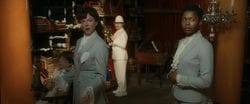
The only other person who comes close to M in terms of brightness is Saraquael...

I'm certain that it is not only relevant but important...
Any ideas?
#good omens#everything is meant#but what does it mean#good omens meta#good omens 2#Muriel#terry pratchett#neil gaiman
118 notes
·
View notes
Text
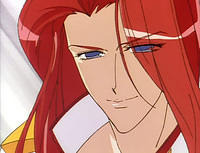
"Your sister's as cute as you are. And as easy-going."
I was going to make a "why did he say this, what's wrong with him" joke, but actually let's unpack this? Fully inviting people to help me unpack this- it's Utena, I'm sure I'll miss something.
The thing that jumped out at me upon first watching this scene is that it's really blatant flirting. "You and your sister are equally cute", he says, just having had sex with said sister.
And I initially couldn't figure out why he did this! Like, this whole scene is about baiting Miki into dueling, the sex with Kozue included. But this? This moment where he straight-up hits on Miki? I couldn't make it fit.
The best explanation I can think of is that flirting with Miki is, like, a show of dominance. "I'm going to compare you to a girl I just had sex with, what are you going to do about it? Nothing. I have the power here." It makes Miki feel more helpless- it also makes him feel some other things, if this shit
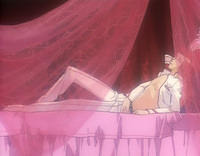
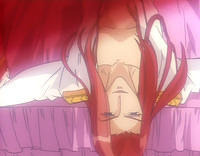
is any indication*, but I think the point is less "give Miki the most confusing and twisted bisexual awakening in existence" (although I do think Touga would find that funny) and more "treat Miki like an inferior".
*I am only slightly joking. Like, Flashback Touga doesn't repeat the flirty line, just the stuff about the Rose Bride, but the fact that he's being framed like That in Miki's mind, even though there's also the image of him leaning on the piano with his shirt off that actually happened and would be way less suspicious to linger on... I'm sure there's more to it than just Miki being thirsty, but I think that part is definitely there.
Also, as a younger guy with similar-but-not-yet-as-severe sibling issues, Miki is objectively the best candidate if Touga ever decided he wanted to have his own Touga- that is, Touga in relation to Akio. I don't think Touga ever even tries to go through with it, but this might be laying the groundwork for a similar fucked-up apprenticeship. Make Miki want to be Touga and also stir up some sexual feelings and the Yikesfest follows.
#revolutionary girl utena#shoujo kakumei utena#rgu#sku#touga kiryuu#kiryuu touga#miki kaoru#kaoru miki#the sunlit garden- finale
60 notes
·
View notes
Text
"Jumanji" speculation
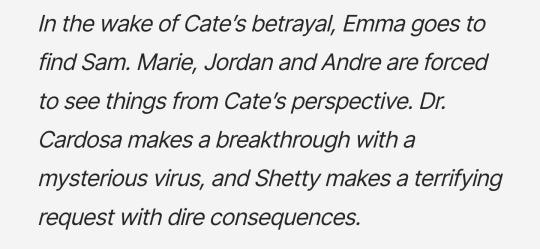
This is the synopsis for the upcoming sixth episode of Gen V (source).
My guesses are that:
"Emma goes to find Sam" - Seems like she probably returns to Godolkin's campus since we last saw her in episode 5 with Sam at the drive-in, calling the others to warn them about Cate.
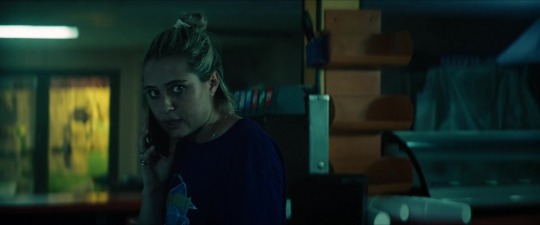
"Marie, Jordan and Andre are forced to see things from Cate's perspective." My guess is this will be a limelight episode for Cate with a fair number of extended flashbacks that illustrate just how Cate came into Shetty's control, and also probably give us more Golden Boy as well as tell us just how Brink fits into this all (and why exactly Golden Boy killed him). Since Cate clearly is wracked with guilt about wiping their minds, it would make sense that she'd want to divulge everything she can to regain their trust. There was a preview shot in episode 6 of Cate's eyes looking pretty bloodshot, suggesting she restored all of their memories, not just Andre's.
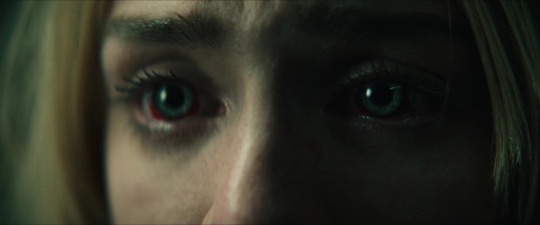
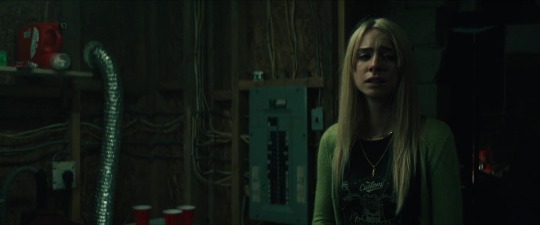
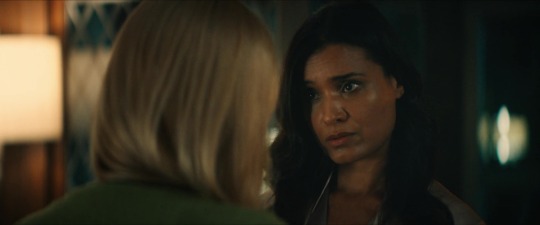
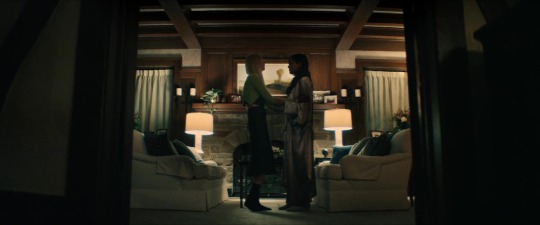
"Dr. Cardosa makes a breakthrough with a mysterious virus, and Shetty makes a terrifying request with dire consequences." We're definitely going to be seeing follow-up to the scene that Shetty had with Cardosa in the Woods corridor. Definitely seems like he wants Marie's blood to perfect his virus that can control Supes (which I personally think might also tie in with why Cate was under Shetty's control, given her particular powerset).
Edison Cardosa: [Sam] nearly killed my family, Indira! He's far more trouble than he's worth, and Golden Boy is dead anyway. The point is, I'm done with Sam. He's not my problem anymore. I'm tired of babysitting psychopaths.
Indira Shetty: Babysitting psychopaths is literally your job.
Edison Cardosa: Those kids found out about him!
Indira Shetty: Those kids have been handled. They won't be a problem.
Edison Cardosa: Come on. You know it's just a matter of time before they find out about everything else we're doing down here. I am this fսcking close to perfecting the virus, a viable way to control them for good. But if they discover that? I'm not paid nearly enough to die for this shit.
Indira Shetty: So you want a raise?
Edison Cardosa: No, that's not what I...
Indira Shetty: So why don't you tell me what it is you do want? Because we both know you're not going anywhere. Cutting up Supes and seeing how they tick is a skill that won't quite shine on your LinkedIn profile.
Edison Cardosa: I want the girl. Marie. Her abilities are the rarest I've ever seen. She doesn't understand how powerful she really is. She's the perfect subject, could speed up my timeline.
Indira Shetty: She is special. But no. You're not the only one interested in Moreau. She has a benefactor, and because of that, she's strictly off-limits. For now.
This will probably include some explanation as to what Soldier Boy might be doing in this show. But then there's the question of who Marie's benefactor is. It's probably not Shetty herself because I don't see why Shetty would refer to herself in the third person, so it's probably someone else within Vought or associated with Vought. Could be Victoria Neuman (since we will see her in person in one of these episodes), but I like the theory that Marie's benefactor is Stan Edgar. As New Rockstars pointed out, he's got a history of taking interest in orphaned Supes from Red River who accidentally killed their own parents (can't be a coincidence that we actually saw Marie's picture briefly on the computer screen when Hughie was at Red River investigating Victoria's past and uncovered her connection to Edgar; Victoria's and Marie's parents also died in similar fashion); he'd want a new asset in the wake of Victoria's double cross, and seeing as Edgar was the one who signed off on Payback betraying Soldier Boy to replace him with Homelander back in 1985, it would make sense for him to have a contingency plan up his sleeve (and be secretly coordinating with Shetty and the many other insiders he probably still has within Vought).
#gen v#marie moreau#emma meyer#cate dunlap#andre anderson#jordan li#gen v spoilers#indira shetty#edison cardosa#soldier boy#stan edgar#victoria neuman#the boys#godolkin university#sam riordan
70 notes
·
View notes
Text
Luke Pearce and Conditional Faith: When Does A Skeptic Believe (or When Does He Want To)?
wc: 1.4k
obligatory disclaimer that these are just my own thoughts and interpretations. spoilers ahead for: SSR Shape Of You (the summer breeze card), SSR Overflowing Thoughts (the sott card), SSR Twinkling Eyes (the skadi card), and Main Story 9.
Luke is a skeptic.
I feel like anyone who is familiar with his stories knows and fully accepts this fact. While he’s a very emotional and warm guy, when it comes to like, his general view of Reality, he is the type of person to believe more in facts, science, evidence, tangible proof, and empirical explanations. A lighthearted example of this is in Luke’s Sweet Chapter Personal Story 3, where he and MC were investigating that abandoned school that everybody said was haunted by spirits and Luke calmly proved that it was nothing more than faulty circuitry. And in the same scene, MC fondly remembers how in their childhood, when other kids were telling ghost stories, Luke would just exclaim “THAT DOESNT MAKE SENSE” and spoil the fun of the spook. He’s such a STEM guy, it drives me nuts.
And his skepticism doesn’t just happen there. It pops up over and over across a lot of his stories, and not just in terms of the supernatural. In general, Luke is a skeptic of anything that can’t be empirically proved, including: folk beliefs, spiritual things, the divine/gods.
(sidenote 1: which is REALLY interesting given what I brought up in a previous analysis I did about Luke and Catholic Guilt. Like, so much of his mental framework and morality is something very familiar to the kinds of ways-of-thinking you’d see in this religion. And yet he’s not religious. god gives the biggest ironies to his most skeptical soldiers, or something).
So he’s a skeptic, that’s clear.
Except it isn’t, because there are times when he does believe in faith. Or wants to believe in it. And these moments are made so striking because of Luke’s general disposition towards skepticism, which is why I’d like to do a deep dive of When Luke “Skeptic Extraordinaire” Pearce Decides Or Desires To Believe.
(sidenote 2: just a disclaimer, all folk beliefs, spiritual things, the different kinds of divine/gods are all obviously very different from each other and I’m not saying that they’re conflate-able, DEFINITELY NOT, but just that in Luke’s stories specifically, they Do serve the same purpose to him; they're something he doesn't believe in)
But before I go into when he Decides Or Desires To Believe, I wanna first tackle why he Doesn’t.
The first reason for why Luke is a skeptic is just his general inclination towards empiricism (things are proven via experience and experimentation) and rationalism (things are proven through logic and reason). Like how it happened in the abandoned school scene I mentioned before. And it makes sense for Luke. He’s a STEM guy, but he’s also a detective. Proof matters, and proof creates reality.
But another reason is more personal. Sometimes Luke doesn’t believe because of a sense of Betrayal mixed in with a “Fuck It, I’ll Do It Myself” mentality.
In SSR Overflowing Thoughts, the AU shows Luke originally being trained to be a temple priest while MC was originally trained to be an assassin. But after seeing the sheer suffering MC had to withstand day after day even after praying to the for a peaceful life, Luke took her place and then later remarks “If gods truly exist, then why didn’t they help you despite all your prayers?” and in the flashback, he says “If she dies one day during training [...] then I’ll stop believing in the gods.”
Here, Luke’s non-belief is due to what he expects higher powers to have responsibility over; taking care of good people. While this card is an AU card, I think it still carries over to regular-Luke because of Luke’s very strong sense of morality, of good and bad. If higher powers are good, but they allow bad to happen, then they can’t be good, or they must not exist in the first place.
So someone else has to do it. In SSR Overflowing Thoughts, it was Luke who saved MC, not the gods. And in SSR Shape of You, during their childhood, Luke had gone missing during the festival to seek the Land God to make a wish to erase himself from existence because Luke believed he was a burden and was robbing MC of the love of her parents buuuuut in the present, Luke remarks that he himself will be the one to repay all the love he had robbed her of.
In a way this is an honestly pretty noble kind of non-belief. There’s a cynical aspect to it, but Luke doesn’t just go “gods aren’t real, cowabummer”. Instead, it’s more like “there are no gods to do the good we want to see in this world, so we have to do that good ourselves.”
So those are what leads to his non-belief, which is 99.9% of the time. But the few times he does the opposite were interesting because Luke only tends to do it under two circumstances.
1) I Want To Believe In This Because I Love You
Two cards I wanna talk about here: SSR Twinkling Eyes and SSR Shape Of You (again, not sorry, this card is so important to this post and also to mE PERSONALLY AHVKHS).
In SSR Twinkling Eyes, Luke was his usual skeptical self at the whole local faerie folk beliefs up until Peanut’s messing up that faerie house meant that under the belief system, misfortune might fall upon MC.
In SSR Shape Of You, at the very end of the story, he releases lanterns that are all wishes for MC’s benefit.
In both these cases, whether or not he truly believes or simply Wants To is up to debate, but it is clear that he does ascribe to actions under something that requires faith due to his love for MC.
What happened to Luke the skeptic? He’s still very much there but there’s caveats now. He’ll ascribe to a degree of belief if it means keeping MC safe, if it means ensuring her safety and happiness in the future. Which is so fucking sweet and tender, fucking hell, Luke “I’ll give the divine a chance if only for you” Pearce, OOOAAAUUUGGHH.
But where there’s light, there’s also dark. Because sometimes his reason is…
2) I Want To Believe In This Because I Hate Me
Two stories I wanna talk about here: SSR Shape Of You (this card is a legend, mentioned 3 times in this post alone…) and Main Story 9
In SSR Shape Of You, the entire reason Luke even looks for the Land God (thus implying that, if even for one night, he did believe in the god) was due to self-loathing. He saw himself as a burden, he wanted to wish he never existed and that nobody would remember him because he was convinced his mere presence caused bad.
In Main Story 9…..hoo boy, Main Story 9, HAHA. At the very end of the chapter, we see a flashback where Luke—a little bit after the mission where he was the only survivor—has this exchange with Aaron

Now, it could be argued that this is more psychological than it is spiritual (this whole thing smacks of unaddressed PTSD, after all) and while that Definitely is a factor, it’s key to note the language used here being specific: spirits, gods, believe.
And why does Luke want to believe? Why does he wish it was real even if his usual inclination is skepticism?
Because he’s guilty. He’s so guilty. And you only ever feel guilty when you think you’re in the wrong. You only ever apologize when you think you’re responsible for wrong.
He wants to believe because he thinks himself a sinner and that only afterlife can grant him a chance at absolution.
That’s the flipside of his belief. Either he loves another so much or hates himself too much.
So like, now that we’re here, what does it all “Mean” then? Ehhhh nothing much tbh jHVKJ. It just Struck Me. It’s just something I really liked seeing because it’s such a genuine and human kind of ‘hypocrisy’; no matter how rooted in reality we are, when we’re driven by intense emotion (positive OR negative), we’ll grasp for more.
More what? More Anything. More answers, more possibilities, just…More. Sometimes intense emotion makes Just Reality feel like it isn’t enough to explain or address whatever we’re feeling.
When Luke is pushed by his devoted love or by his intense self-loathing, the limits of tangible empirical reality just don’t cut it. He’ll believe or want to believe in something more.
#tears of themis#tears of themis analysis#luke pearce#tot luke#xia yan#if there are typos pls close ur eyes. i was possessed writing this all
88 notes
·
View notes
Text
Understanding the Core Four of La Pluie
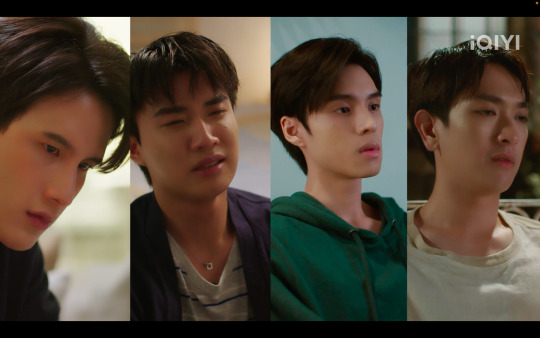
Last Saturday, I screamed into this hellsite about the brilliance of La Pluie episode 10, and in the last couple of days, I read many amazing metas from my fellow La Pluie fiends that broke down all the well-executed dimensions of this episode (keep an eye out for this week’s La Pluie meta roundup from my pal @lurkingshan). When we last saw these characters in episode 9, Lomfon was running the hamster wheel in his brain, trying to figure out how to navigate his situation of hearing Saengtai (and Patts) when it rained. Tien was nursing a crush on Lomfon, and Tai and Patts had made things official and were stronger than ever. Then came episode 10, which turned everything upside down and left us speechless.
I loved and enjoyed every aspect of this episode: acting, plot development, cinematography, screenwriting, and more. But the one that blew me away the most was how the motivation and drive behind each character’s actions were perfectly in line with the character traits the show has already established. I initially wanted to write this post only to explore these traits, but after observing the La Pluie fandom discourse for the past week, I expanded it to include my defense of why every character in the La Pluie Core Four "deserves" the resolutions the show is poised to give them in the coming days.
Tien:
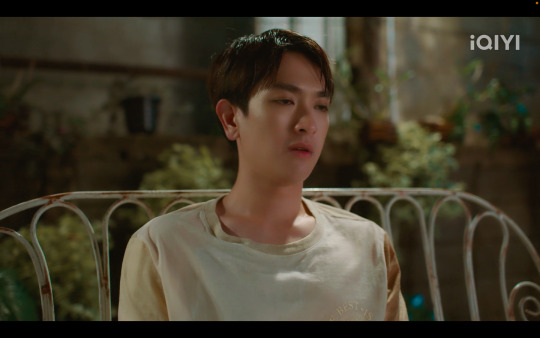
When Tien enters the pivotal conflict scene in the rain, he walks into a kiss between his brother and the guy he has a crush on. Absolutely heartbreaking. We see him stand still on the side, while Patts rushes to push Lomfon away from Tai and punch him repeatedly in the face (though not hard enough, as my friend @bengiyo argues here, and I fully agree. That ass-whooping should've been harder and longer). And after Patts and Tai walk away, Tien faces Lomfon, who just recklessly messed up the lives of everyone around him with no regard for anyone's feelings.
Here’s a quick list of Tien’s personality traits that were on display in this scene:
Tien is calm. He is pissed, he is rattled by the events, and yet he starts with a pretty calm "What did you mean?"
Tien is logical. He immediately counters Lomfon's explanation about his hearing loss and him being Saengtai's soulmate with, "You liar. I'm speaking now, and you can hear me."
Tien is a good communicator. He clearly confessed his feelings to Lomfon and how he thought his feelings were reciprocated, even when his heart was in tatters. He managed to be the most open and honest person out of everyone involved in this mess, and he hadn’t even done anything wrong. We would’ve completely understood his actions if he had just walked away after cussing out Lomfon, but that’s not the Tien we’ve seen and adored for the last nine episodes.
Tien is brave. He had been developing feelings for Lomfon for a while, and he thought his feelings were reciprocated. Being vulnerable and confessing your feelings to your crush is a nerve-wracking experience in its own right, and yet Tien confessed his feelings after Lomfon had just kissed his brother, potentially ruining any possibility of a relationship between them. For that alone, he is one of the bravest sonsofbitches I've seen in a BL so far.
I was not expecting to be surprised by Tien in this episode. I don’t exactly know what I thought his reaction would be to the Lomfon-sized wreaking ball I knew was coming, but I had only anticipated a heartbroken Tien. Instead, I got a Tien who was the only level-headed and rational person in this fight. And all of these wonderful traits were already established in the show's previous episodes:
Tien is one of the calmer Saengs. We have seen each of the Saeng brothers handle their parents' split very differently in the flashbacks. Saengtai and Saengchan are usually in tears and are physically reactive, whereas Saengtien and Saengnuea are the ones holding them back and comforting them.
Lomfon is not the only one who ran experiments to understand his feelings. Tien is also logical (albeit less neurotic and more sensible than Lomfon), and he worked through his sudden feelings for Lomfon after they held hands in the classroom by holding hands with his friends. He’s also open to opinions from others, as he talks to Tai about his feelings. Which makes him…
A good communicator. Tien also calls out Tai’s reluctance to communicate with his mother rationally, and to try and understand her side of things in the divorce and her relationship with her boyfriend, Nu.
Tien is an excellent subversion of the "playful and less mature younger sibling" character because, while he is easy-going and playful, he’s also the most emotionally intelligent and mature character out of the Core Four. Moving on to his elder, albeit much less emotionally mature brother, Tai.
Tai and Patts:
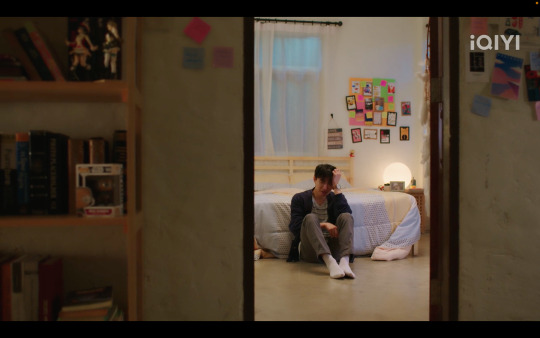
I’m analyzing Patts and Tai’s actions together because this way it’s easier to compare their words and actions towards each other in this episode, to their relationship dynamics that were established previously. The explosive fight and the subsequent breakup were shocking, but smart cookies like @lurkingshan, @bengiyo, @shortpplfedup and @ginnymoonbeam posited in our conversations, before the episode aired, that it was time for Patts’ frustrations and insecurities to rise to the surface. And boy did it rise up. This conflict between the primary couple has already been extensively analyzed by @lurkingshan here, so I will add my little observations on how Patts and Tai’s behavior in this fight is supported by the writing of the show so far.
@ginnymoonbeam has shared her thoughts on Tai’s avoidant personality, here. I want to add that Tai is also incredibly stubborn and hard to please. His father says so, to Patts during their dinner in episode 5.


The phrase "seems like an understanding person" is very telling, five episodes later. Tai also has the propensity to see life in black and white, especially when it comes to romance. His faith in soulmates is broken the moment he witnesses the end of a soulmate relationship. There is no room for explanation, as evidenced by his decision to ghost his soulmate for 2 years, and his coldness towards his mom, whom he has decided is the sole villain in their parents’ divorce. Simply put, he reads too much Nora Roberts (check out @syrena-del-mar’s excellent meta, La Pluie meets Nora Roberts).
Moving on to Patts. First off: no Patts hate is allowed in this house. I do not condone violence, but I also think the reasons behind the display of violence deserve to be talked about without the air of dismissal surrounding it (@shortpplfedup backs me up on this, here).
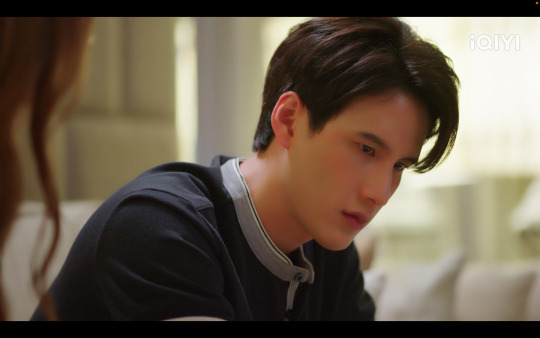
Patts had been understanding of two years of silence from Tai, and had been incredibly patient while working and finding solutions to Tai's fears around relationships and commitment. All the emotional labor in this relationship had been done by Patts, he verbalizes his desires and thoughts every time and is often left hanging by Tai, in silence. After Patts and Tai’s (supposed) heart-to-heart in Doi Mae Pliang (shout out to @indigostarfire and @lurkingshan for the incredible observation that Tai chose not to verbalize his answer to Patts’ question "Do you want to be my faen?", here and here), Patts must’ve felt that they are finally on solid ground, after years of uncertainty.
When Tai lied and hid his plans with Lomfon at the park, Patts must’ve felt devastated. And when he saw Lomfon kiss Tai, he finally snapped. He took out his anger on Lomfon, but as @bengiyo observed, Patts still managed to not leave a single bruise on Lomfon. His restraint is a sign that his frustration is not directed at Lomfon, but at Tai. Patts’ anger and Tai’s refusal to communicate openly escalate the fight further and further, until all the tension breaks at Tai’s room, with Patts agreeing to break up.
Something that stood out to me in this conflict is that the escalations were so well written that they did not feel like they were being done just for the sake of moving the plot along. Every question thrown at each other’s faces and every furious answer spit out in response felt natural and fluid. When Patts shows up at Tai’s door, he is not there with the intention of picking the fight back up. The first thing Tai asks Patts is, "Are you drunk?" and Patts tells him that he is not. They both know and understand how horribly this can go if one of them loses control. When Patts asks him "You still love me, don’t you?", Tai infuriatingly responds "This is exactly why I don’t want to talk to you".
And we see Patts getting angry at his response, shouting this:
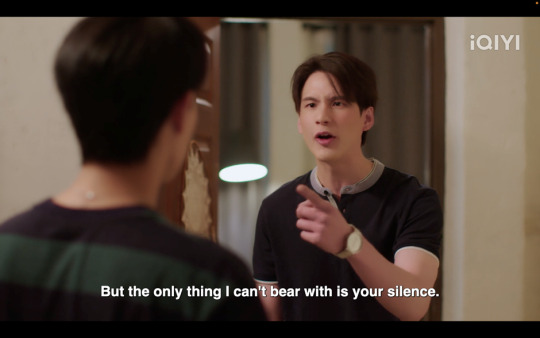
To which Tai responds with this:


Tai did not utter those words to aggravate Patts. He truly believes that in an ideal, happy relationship, the couple must be completely compatible, so totally in sync that they will know all the answers to the questions that didn’t even need to be asked. Tai stumbled into a clear understanding of the Patts-Nara mess in episode 8 and told Patts that he was not mad about it. He did not ask questions or demand answers from Patts. Sometime during his deadly trek up Doi Mae Pliang, Tai decides that their love is enough to conquer whatever the universe throws at them. Not understanding, not communication, but love. That’s why Tai shuts down every time Patts demands an explanation; he thinks needing one means that Patts does not love him "the right way". And when Patts finally blurts out "Let’s breakup", we see him immediately absorb the weight of those words and backtrack. But for Tai, this is the final proof he needed to confirm that Patts is not right for him. So, he thanks Patts for the time they shared together and shuts the door in his face.
I sincerely hope Patts holds his ground and does not apologize unnecessarily to Tai. Tai is 100% in the wrong here; he needs a stern talking-to from someone who understands both Tai and how love and relationships actually work (my money is on Tai’s dad), and then he needs to do some very difficult but necessary introspection about his understanding of love. When he is finally done and realizes that he has made a massive mistake, I hope that Tai is the one who seeks out Patts to reconcile.
And finally, the messiest mess of the Core Four…
Lomfon:
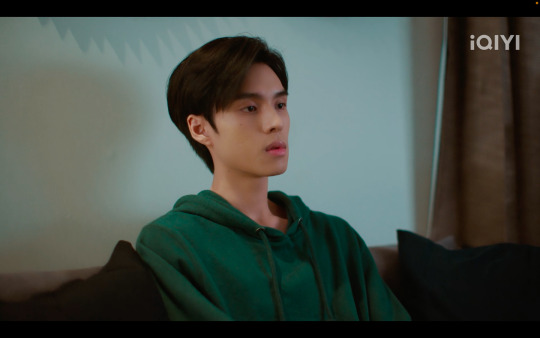
Sigh. Oh Lomfon, you fucking disaster. I’ve been wary of you, I’ve been fascinated by you, and now I want to buy a ladder so I can climb on it and ring your head like a fucking bell till you forget the “How to acquire Tai in ten easy steps” list you have in your head.
There is no question in my mind that Lomfon fucked up spectacularly. He orchestrated a date with a man who was already taken, proceeded to reveal the truth about his soulmate connection in the most dramatic and emotionally destabilizing way possible, and then kissed him. And he does all this in the midst of developing feelings for this man’s brother.
Folks, I now have a confession to make. The nearly 2k words I had put before this section were to gently lure you into an "In defense of Lomfon" post.
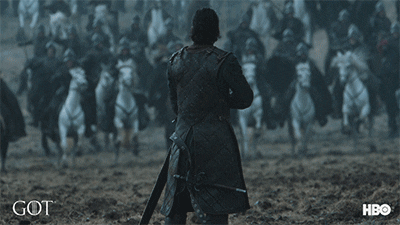
The two major criticisms I’ve seen so far that are leveled against him are that he has disregarded Tien’s feelings and that he has been grossly manipulative in how he chose to reveal his soulmate connection to Tai. I will try to tackle both of them with an objective lens. My goal here is not to pose an explanation or argument for every shitty thing Lomfon has ever done in the show; it is just to present Lomfon’s traits, stripped from the (rightful) anger the fandom feels after the events of episode 10, so I can understand and accept the redemption the show might give him in the coming week.
Before I get into the specifics of the defense, I want to focus on the Keychain Acquisition scene we finally got in this episode. We see Tai run after his dad, and Tai suddenly notices Lomfon, who is focused on the papers in his hand and wearing headphones, about to walk into a busy street. He rushes to push Lomfon out of the way, tells him to be careful, and then runs after his dad again. From the moment Tai touches Lomfon, to the moment Lomfon looks up only to see Tai running back, this whole interaction takes about fifteen seconds. I counted them. Fifteen seconds.
When we watched this scene, @lurkingshan and I could not believe how absurdly mundane it was. The show has been teasing a connection between Tai and Lomfon for weeks, and this is it? Tai pushed him out of the way of a moving car and shouted an obligatory "be careful, it’s dangerous" in Lomfon’s general direction before going back to his own problems. But that’s all it took for Lomfon to decide that this mystery stranger is his "first love". He did not even get a proper glimpse of Tai because, by the time he looked up, Tai was already running. I wonder how much of Tai’s voice he actually registered, given the fact that he had to rip his earphones off first and that he was disoriented from being pushed to the ground.
I understand that teenagers have wild imaginations, but even for them, this is a level of delusion that is only achievable if any and all human contact is rare. I have held hands and gently pulled and pushed friends and family members out of the way countless times in my life while crossing a busy road. If Lomfon had saved the keychain as a reminder of the day he almost died before a kind stranger saved his life, this would be a completely different post. Since Lomfon attaches such an intense meaning to an event that is so commonplace (the showing-kindness-to-strangers part, not the almost getting-hit-by-a-car part), all this scene shows us is that Lomfon is utterly and pathetically lonely.
I’m not just reading this from the keychain scene. Since this show has some very clever writers, Lomfon’s "Social Loner" status is established from the very first episode. Before Tien meets Lomfon at the bookstore, we see Tien interact with his friends and his brother. In contrast to this, when we see Lomfon for the first time, he’s alone and is immediately picking a fight with Tien. Which leads to Lomfon meeting Tai for the very first time, and Tai intervening to break up the catfight. Tien even says this to Lomfon:
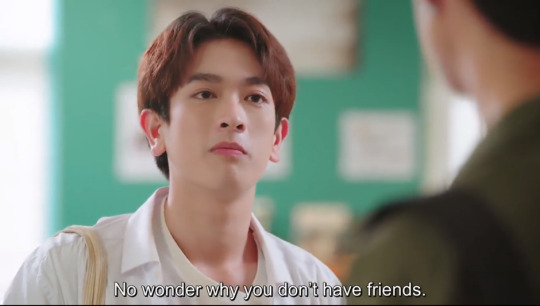
Remember when we were theorizing about Lomfon potentially knowing Tai before this incident, after the Keychain was introduced in episode 7? Because in episode 2, when he meets Tai at the coffee shop, he talks about Tai’s articles? And we were thinking, there’s no way he just stalked this person online after meeting him for about 2 minutes, just because he took his side. Nobody would be that obsessed, right? Right? Nope. This boy is really THAT obsessed, because he does not have a single friend who can take his side on a daily basis and normalize this experience for him.
With this information, some of Lomfon’s actions start making a little bit more sense, as his social isolation must make him very inept at reading normal social cues and emotions. He may fancy himself a logician, but he cannot factor feelings and emotions, his own or otherwise, into his calculations. I intentionally only used the word "obsession" when I talked about his feelings for Tai, because I know that he’s not pursuing Tai because he felt his heart flutter in his chest. He’s pursuing him because: 1. Tai took his side in the bookstore argument; 2. He then went home and stalked Tai on the internet and figured out that he’s a writer, which was interesting, because he likes... reading, I guess? (I’m feeling physical pain due to second-hand embarrassment from typing that sentence.) and 3. He found out that Tai has read some of his favorite books and figured that they must have the same passions and interests.
And here is my defense for the first criticism: When we consider just how little time he must’ve spent in his entire life, thinking about other people and their problems (because he must have the heartfelt and intimate connection it requires with only a rare few people), Lomfon does care for Tien. He held Tien back when he was recklessly rushing into a storm to save his brother. He calmed Tien down with very persuasive arguments that were both logical and empathetic. He respected Tien’s opinions enough to discuss the concept of soulmates with him twice (in episodes 7 and 10). During their discussion in episode 10, Tien tells him he doesn’t know whether he would choose his soulmate or someone he likes. After the scene, we see Lomfon sitting alone, ruminating on this thought for a few seconds. He asks his friend and possible crush for advice on what to do, and when he doesn’t get a concrete solution, he decides to give his way a try. And we see him make the call to invite Tien to lunch and a day at the park.
And what exactly was he trying to accomplish on this date, you may ask? Well, to paraphrase @bengiyo, he just wanted to run an experiment for "The Foot Pop" theory from The Princess Diaries. Matters of the heart are not something you can distil into equations. You either have to let the desire fully confront you, let it cloud your logical brain, and bravely let it guide you into your next steps. Or you can open up and be vulnerable about it with the people closest to you, ask for their opinions, and then take a decision that’s a bit more informed, yet firmly rooted in what you want based on what you feel. Both of these options are foreign to Lomfon. He has never solved problems this way, nor has he witnessed someone solving problems like this. So he recklessly kisses Tai, to prove to himself that all the calculations he had performed on his and Tai’s compatibility were right. He kisses Tai, and when he does not feel the butterflies, he pulls back, sees Tai’s stunned face, and immediately realizes that he has made a horrible, horrible mistake.

You know where he should’ve run the experiment, for better results? Riiiiiight here:

gif by the ever lovely @liyazaki
It could’ve been so simple and sweet. This loser just had to take the route that would cause the most damage.
Moving on to the second criticism that Lomfon is shady and manipulative in his actions in episode 10. I agree, he easily could’ve found a much less dramatic way to talk to Tai and Patts about this shared soulmate bond situation. But taking this straightforward route takes a lot of social courage and nuance, which Lomfon clearly does not have. If he and Patts had not been staring daggers since the moment they laid eyes on each other, the solution to their soulmate problem could’ve been calmly discussed at a table over breakfast. Since Lomfon decides to posture up to Patts as a romantic rival, with Patts already on edge about his intentions with Tai, Patts brusquely tells him to stay away from Tai. Which does not help matters one bit, and leads to Lomfon making all the wrong moves straight into disaster.
The biggest questions that were constantly in my head after this fiasco were "How the heck is Tien ever going to forgive him?". "Is a happily ever after even on the cards for Lomfon and Tien?". "Will it be believable and realistic if the writers give us one?".
I do not want to speculate on how the writers may choose to end this arc, because I want to ponder these questions purely based on what we know so far, without an ending of my choice already in my head, so I don’t skew my arguments to fit.
Lomfon may believe that Tai is the one who is most compatible with him, but he could not be more wrong. We have not seen any interactions between them where their personalities complement each other. We only see Tai in these interactions through Lomfon’s obsessive lens. But on the flip side, we see that Tien is rational and emotionally mature enough to give Lomfon an honest chance to explain himself and apologize. If Lomfon takes the time to look inward and understand his feelings for Tien, he will then convey them with sharp focus, and without any ambiguity. Because, let’s be honest, Lomfon is many things, but he is definitely not the type to prattle. And for Tien, who is also a straightforward and no-nonsense communicator, this approach might be the first step towards understanding and eventually forgiving Lomfon.
I know that I am skirting around a lot of Lomfon’s major fuckups on this road to redemption, but as I stated before, I’m not here to explain away all of his mistakes. I know Lomfon has some serious introspection and atonement in front of him. The only way he can ever hope for forgiveness is if he goes into this journey without hoping to be forgiven. He has to do it for the people that he has hurt, with no expectations in return.
Lomfon is not irredeemable. Does he deserve all the hate he is currently getting from the fandom? Yes. Did he deserve the ass-whooping? Hell yes. Will he also be worthy of Tien’s (and our) forgiveness if and when he reevaluates all of his actions and apologizes to him? Absolutely.
Shoutout to @lurkingshan, @bengiyo, @shortpplfedup, @wen-kexing-apologist, @ginnymoonbeam and @kyr-kun-chan for discussing their La Pluie thoughts and opinions with me, which helped coalesce my thoughts into this post.
Tagging @blmpff on request
#la pluie#la pluie the series#la pluie meta#pattstai#patts x saengtai#title tanatorn#tien x lomfon#pee peerawich#suar kritsanaphong#copter nuntapong
83 notes
·
View notes
Text
Who do you think will die in future chapters of Black Butler?
I know I've already made a similar post theorising over how Black Butler will end but I'm very interested in Black Butler fan theories at the moment.
I'm gonna be explaining who I think will die in the future and why, some may have more detailed explanations than others since sometimes I just have hunches a character will die and sometimes I have better reasons to think so and I may also go into how I think they will die.
(warning: spoilers for a lot of the story)
1. Elizabeth Midford
There are 2 main reasons I think Lizzy will die, 1 is that I just have a hunch, Lizzy is a sweet girl but we've seen that no matter how sweet you are in the Black Butler universe there is a huge chance you will die (cough cough Agni).
And also there is a bit of foreshadowing in episode 6 (I think) of Book Of Circus. During one of fake Ciel's monologue flashbacks it shows him sitting on top of a throne with dead bodies of familiar characters beneath him. Most of the characters are characters who had already died before then such as Madame Red and Vincent, but when rewatching that scene I realised Lizzy was there as well. Could that be foreshadowing Lizzy will die in the future?
Maybe the next time she sees the fake Ciel he'll try to kill her as revenge for basically pretending to be the real Ciel, therefore Sebastian will have to come in and protect him, maybe even killing Lizzy or the least severely injuring her (and after that Undertaker could turn her into a bizarre doll or something)
2. Soma
This is definitely more of a hunch than evidence. Soma hasn't been in the manga in almost 100 chapters and we haven't seen him since 2017, the last time we saw him he was grieving over Agni's death.
I'm pretty sure he'll come back since it's not really like Yana Toboso to write off a character and never bring them back unless they canonically died or something, we've seen characters not appear for a while and then return (like majority of the grim reapers, Fred Abberline, sometimes even the servants like Meyrin, Finny and Bard if the current arc doesn't focus on them much and more on other characters like Ciel and Sebastian)
If he does come back I have a feeling he may die, I'm not really sure how though, like maybe he'll mistake Real Ciel for Fake Ciel and will be like "wait a moment why isn't Ciel wearing his eyepatch?" Or something like that and real Ciel will assassinate him to avoid suspicion.
Speaking of Real and Fake Ciel, I wonder how Soma would react if he found out all about that. I mean him and Fake Ciel are basically best friends, would he feel betrayed? Or if Fake Ciel explained why he did it would he forgive him?
3. John Brown, Charles Phipps and Grey
Sorry for including 3 characters in one, it's because these 3 are a trio and I feel like they'll all die for the same reasons.
So, if you haven't noticed or haven't watched the non canon parts of the black butler S1 anime, there are a lot of hints to what happens in the future of the manga despite most of the anime being released prior to those events.
Examples: an animal based servant (in the anime it was Pluto, a dog man and in the manga/canon parts it was Snake, who looks like a snake and can talk to snakes), the servants backstories (while some changes were made in the anime, all of the backstories were mostly the same, Meyrin was an assassin, Finny was an experiment and Bard was a soldier in a brutal war) and Undertaker being revealed to be a grim reaper
Due to all of this I have a theory that John, Phipps and Grey are all angels. Why? Well in the anime Queen Victoria had a servant dressed in white named Ash who was later revealed to be an angel and was the main villain of season 1.
What does Ash have in common with John, Phipps and Grey? They all wear white and they all work for the Queen, they also started out as characters you probably think weren't as important to the story but then later became antagonists.
It also gives Charles Grey more of a reason to stab Sebastian in the murder mystery arc, maybe the whole time he knew Sebastian was a demon? And maybe that's why he wasn't so suspicious when he found Sebastian was alive on the Campania.
I've also sensed that both Grey and Phipps had a bit of a grudge towards Ciel and Sebastian. At first I thought it was because of what happened in the circus arc (which is why the whole murder mystery arc happened), but even after Ciel proved himself they both continued to be a bit iffy around them... Again could this be because they know Sebastian is a demon?
Ash died at the end of season 1 after his evil plot to purify the world by setting London on fire (yeah I don't know why either season 1 had a lot of plot holes) since John, Grey and Phipps are all possible alternative versions of Ash I'm about 90% sure they'll also be killed by Sebastian.
4. Queen Victoria
Sort of the same reason behind why I think John, Phipps and Grey will die, except for this one I have less evidence.
Unlike in the anime, there hasn't been very much foreshadowing that Queen Victoria has made a contract with her 3 angelic servants or even knows they may be angels. However near the end of season 1 in the anime, Ash kills her because she became impure since she didn't want to be cleansed after the part of her body that was Albert began to rot.
I'm not sure if that'll be the reason for her death in the manga since unlike the anime her grief over Albert is usually played for comedic affect (like when John Brown used a doll of Albert to cheer Victoria up) but maybe there will be another reason. If she doesn't know her servants are angels but later finds out, they may kill her. Or maybe she'll just be killed by Ciel and Sebastian for some reason.
5. Real Ciel
I think the majority of us theorize he will die, he's a bizarre doll after all and almost every bizarre doll in the story has been killed, also he's sort of one of the main antagonists now after he exposed Fake Ciel for pretending to be him after death.
Again I'm not sure how he'll die exactly, but I'm about 90% sure he will die
#black butler#kuroshitsuji#fan theory#theory#death#ciel phantomhive#sebastian michaelis#elizabeth midford#madame red#vincent phantomhive#charles grey#charles phipps#the double charles's#john brown#queen victoria#prince soma#rant
25 notes
·
View notes
Text

The Venture Bros. #46: "The Revenge Society" | November 16, 2009 - 12:00AM | S04E05
Look, I love and respect The Venture Bros. Please know that I’m coming from a place of love when I say that this episode has that season three stank on it.
Generally speaking, I feel like the show has ebbs and flows, vacillating somewhat between episodes where the humor and standalone adventure is emphasized and episodes that feel like an exercise in world-building and character lore. I enjoy piecing together the somewhat complicated story and character histories and stuff like that, because I love this show. But the reason I love this show is for standalone adventures and humor.
This one focuses on Phantom Limb’s reemergence as the head of the Revenge Society, which we find out is comprised of a lady’s shoe (Dr. Mrs. The Monarch’s shoe, I think), a Mug with the word WISDOM on it, and a toaster. Phantom Limb has lost his mind, and treats these all like they’re real guys. One of my favorite jokes of the episode includes the use of the oriental riff, used when Phantom Limb introduces his mug Wisdom. Guy’s gone so crazy that he’s assigned a race to a dang cup.
This one features a lotta people explaining things to each other. We find out what two of the Council of 13 look like, for instance. We also find out that they are elderly Buddy Holly and the Big Bopper (now known as the Red Mantle and Dragoon, respectively), and they were coaxed away from the airplane that would have killed them by Phantom Limb’s grandfather Phantomas. The fact that these supervillains began life as kidnapped musicians is the explanation for why David Bowie is the Sovereign. Phantom Limb kidnaps Billy Quizboy and has him surgically place Dragoon’s head onto the Red Mantle’s body after attacking them so severely that such a drastic act is their only hope for surviving. They become another Jackson and Doc comedy duo.
Eventually, the Guild of Calamitous Intent show up to the Venture compound while Hatred, Hank, Doc, and Dean all sorta spit off into pairs and stall for time. This makes the episode feel a little listless, like those boring-ass sequences in the Two Towers movie where Hobbits are goofing off with those walking trees. I don’t mind scenes where nothing really happens and characters just chit-chat, as long as it’s funny. I don’t find these scenes to be particularly strong.
Okay, so Phantom Limb is trying to get the Orb (from before). Billy Quizboy knows where it is, which is why the Guild show up to the Ventures door. At some point, the Ventures confront the guild. Dean is paraded as the heir to the Orb or maybe the guild? I guess because Rusty’s grandfather was the protector of the Orb? I don’t know if I really “get” this part at all, but it’s all leading to the conclusion of the orb saga.
Dean knights the current Soverign as the heir to the Orb (I think?) and Phantom Limb tries to get it, only to find out that it’s broken. We then cut to the same flashback from season three, which shows Sandow seemingly strangle Rusty’s father’s father. The scene continues to reveal that Sandow simply broke the orb, and left the elder Ventures’ skull in tact. Apparently this reveal was planned all along, which is why they make the skull-smashing/neck-breaking sound a little metallic-sounding in season three.
The final scene also features a Brian Eno stand-in called Eon. I didn’t know who this was, honestly, and had to look it up. I know who Brian Eno is, I just mean I don’t think I remembered at all what that dude looked like. Is that the real Brian Eno doing the voice? Seriously, no source that would list such a thing lists an actor for him, nor do they point out that he’s voiced by “(unknown)”. I also don’t see anyone asking who the voice is. Am I dumb?
Other stuff ahead: the dilapidated mansion that Phantom Limb brings Billy, Red Mantle, and Dragoon to comes back later, so keep your peepers peeled if you are a huge dork who likes remembering stuff from cartoons.
More other stuff: this episode pays off Hatred’s fixation on Billy, who is a child-sized but oh-so-legal little man. Billy is knocked unconscious and eventually finds himself in Hatred’s bed. The commentary, the book, and eventually dialogue from a later episode all insist that Hatred didn’t rape Billy; Hatred just cuddled him while he recovered.
And finally, the joke at the end, where Red Mantle tries to jam in a two-headed-related quip to no effect is real funny. I like that joke. See? I told you I love and respect this show.
10 notes
·
View notes
Text
Smoke, Salt and Asbestos: A Friendly Review
Introduction and Format Explanation:
I've just finished reading Smoke, Salt And Asbestos by @quietly-by-myself. In the communities where I spend most of my time here on Tumblr, I see occasional recommendations but nothing I would call a review, so I thought I'd go into a little more detail about why I enjoyed this story. I'm still a relative newcomer here in 2024, so if I'm wrong about that, send links in the notes and I will include them here!
The reason I think a positive review might be useful to my audience is that, when people praise a story, they seldom give enough detail for me to know as a reader if I will also want to read it. These are stories I liked personally, and this means that reviews will mostly be of hurt/comfort stories with happy or at least ambiguous endings.
Ambiguous here means characters may part, or may have dangling plot threads for later, but they have survived and are in some way better or recovering.
This doesn't mean I disliked everything I didn't review; I read a lot of stories and can't review them all. This is just for stories that are completed according to the author (something of a rare category already) and that I thought deserved special mention.
Another reason is that the Tumblr writing format is more akin to the magazine serials of yesteryear than a novel. Each installment has to have something to hook a reader's attention, and any overarching plot must serve that goal. This is different from writing a short story, intended to build rapidly to a punchy conclusion, or a novel, which may scatter its impactive moments on the way to a three to five-act structure. I will argue to the death that this is its own valid art form, and as such, it deserves to be reviewed as much as any published short-form content collection.
I'll attempt some light analysis, but I won't ask authors if I'm right about their intent first, so you only get my reader impressions on it. As such, I might be wrong about some or all of how I describe a story and its lore. I don't insist on death of the author once a review is up, so authors are welcome and encouraged to comment!
Summary:
In brief, and without major spoilers, SSA is an original fantasy story about an alchemist, in this case a more external science-based form of magic practitioner, who finds and tries to help a changeling, a badly injured fae creature who has been abused by his former family and village. There is violent content but no sexual content.
Vibes:
If you're reading this as a whump fan, the biggest thing you probably want to know is the vibe. We all have that feel we're looking for, and it's radically different for different people.
This is a hurt/comfort story, where the people doing the harm are mostly offscreen and in flashback. (This will surprise no one who's read my own work on here; I mostly prefer h/c and will therefore mostly write and review that.) There's a lot of dwelling on the pain, both physical and emotional, of the character Briac, a changeling who has been terribly beaten and tortured by his human community and family through no fault of his own (he was not aware he was a changeling either). And there's a long, carefully articulated treatment and recovery arc. His rescuer Silvanus' arc is more emotional than physical, but he has a bit of this too with a curse he is under (again, almost from birth, and through no fault of his own).
There's a short period where Silvanus causes Briac further pain, first out of ignorance of how to treat him, then because the magical healing process is itself painful. It's never out of malice, so if you also like accidental carewhumper vibes, there's a bit of that too. I'm normally not into carewhump, but I ended up liking this a lot, too. It's a source of potent emotions but feels safe enough that I don't feel afraid of a bad ending.
There are a lot of teary and emotional scenes here dealing with Briac and Silvanus coping with their situations and relationships (again, no spoilers). I thought these were handled well, even if they're not what I necessarily come to a story for.
Characters and Setting:
This story is set in an original high fantasy universe with some thorough and interesting lore. There are many ways to interpret fae, as with vampires or living weapons or any other topic, and this one hints at a bigger world without interrupting the story with tons of exposition. I really liked that. I like whump stories, but I also love deep lore.
This story deals with two magic systems, magery and alchemy, with alchemists using an external Source and strict rules and documentation, and the magic of mages and fae being more flowing and subjective. The magic words we're shown for the latter are surreal and poetic, and that's a flavor that I liked for these strange creatures and their relationship to the caprice of the natural world.
Themes (Mild Spoilers):
The overall theme of Salt, Smoke and Asbestos reads to me like a meditation on familial estrangement. It's not a tough read into the material. Briac was abandoned and even permanently scarred by his human mother. He doesn't know who his fae parents were, and has no way to find out.
Silvanus was cursed as a child because his parents attacked the fae, was adopted by other fae, and then was forced to leave the sanctuary where he grew up because the curse gives him a bad smell to these creatures. As a result, he has less contact with his sister, with whom he has an overall positive relationship and whom he would obviously like to see more. He can't interpret his fae foster father's attitude and actions and has a lot of angst about that, too.
Silvanus eventually has to suffer another familial abandonment by yet another surrogate. It's not surprising that he is ultimately better able to connect with Briac, another broken bird who does not represent his repeated abandonment by those who should have cared for him, and that the ultimate denouement of the story is about assembling your own new bonds more than it is about trying to regain the old ones. Not only that, but a key climax of the overall story has to do with Silvanus' determination not to abandon Briac as they have both been abandoned before.
I thought the overall treatment of this was very satisfying and cathartic.
Final Comments and Recommendation:
I binged this story over a couple of sessions. I thought it flowed well and was a very easy, appealing read. As a whump story, it has some excellent hurt/comfort content. It's not a romance, but characters ultimately do form close bonds, and I liked that. It's rare and nice to find an acknowledgment of the value of platonic bonding. Obviously I will be wrong about that if the characters became romantically involved later, but that's how it looks to me from what I read.
If you like hurt and comfort whump in a fantasy setting, give this story a look!
#whump#whumpblr#@quietly-by-myself#syncopein3d future reference#whump reviews#whump review#sweet whump#hurt/comfort#fantasy whump
5 notes
·
View notes
Note
🔥 Luda & Aleksander
I don't really know of any unpopular opinions about this? Just because I feel like it isn't talked about enough. But here are some of my thoughts:
The flashback with Luda and Aleksander was decent, but it failed to convey the exact traumas which drive Aleksander, and the core motivations that make up a large part of his character. If they'd had the Lusander flashback whilst also adding the DiTW flashback at a later time, I wouldn't have minded, but since they only included the Lusander one it felt as if it really flattened his character.
The specific brand of trauma that comes with growing up without touch, being completely isolated, and being shunned for being both grisha and shadow summoner within your own community, is largely glossed over in the show.
The way he internalizes what happens, the way his trust is explicitly fostered and then broken, the way he craves connection and friendship so much he abandons all caution. The way he was going to be killed not because someone hated him, but because they were so desperate for survival they thought the only solution was to literally betray him and wear his bones. The absolute perverse and invasive way he would have died and been desecrated. Like there is a specific brand of horror to his situation that was lost with the Luda and Aleksander flashback. In fact it practically erases all significance tied to being an amplifier at all.
The lack of the DiTW flashback also serves to erase half of his character and the depth of it. We never get to see how his immediate response to Annika trying to kill him was to offer help and to offer protection - completely selflessly and not in any way as a means of manipulation to save himself. He underwent a horror so extreme and all he could do was wish he could make her situation better. So that she would never have to hurt him, and she would never have to be afraid enough to do so.
The way his empathy and compassion and protectiveness is shown. The way he internalizes his trauma in such a way that all he can think about is creating a safe place for his fellow grisha and for himself, and the way this also just severs his connection to mortality and mortals so completely. The Lusander flashback just doesn't touch on it at all, and even Luda's mortality and the realization of it feels off, because it should have happened to him ages ago.
I thought the Lusander scene was decent at showing the persecution of his people, but it lacked any real horror. And the way he acted with Luda was just slightly too off for me, although I can understand how it fit into his show character more, and maybe if Luda is his first real love in centuries after his trauma with Annika, it would make more sense.
But all in all, I don't know if it's an unpopular opinion, but I'm not really a fan of Lusander or the way they did the flashback. It was okay, but I'm not giving it any awards. At least it properly conveyed how fucked up grisha persecution and the lantsovs are, and at least it gave a more reasonable explanation for the fold not being the tactical boon it could have been.
I also like how the existence of Luda in his past creates some compelling ways for him to relate that trauma to the people in his life. Like I think he sees Luda in Mal, and he sees his relationship with her in Alina and Mal's relationship. It could have been done well if it was incorporated with his book history, but as it is, it feels like the writers took the easy way out.
send me a 🔥 for an unpopular opinion (x)
#aleksander morovoza#the darkling#shadow and bone#sab#grishaverse#sab critical#lusander critical#???#idk aklsjdflds#i've never posted about it before#myramblings#sab meta#demon in the wood#asks and answers#ty for the ask nonny! <3 <3#anon#ask games
35 notes
·
View notes
Text
So, who the hell is Cross Marian?
Everything under the cut because it includes spoilers from 245!
Now, Wit made the mistake of joking about how Cross might actually be Cyrus Campbell and well. That made a little too much sense.
What prompted this was the scene in Night 245 where Maria stops Cross from hurting Allen, and there you can see a panel of her when she was still alive and she bears a striking resemblance to Caterina.
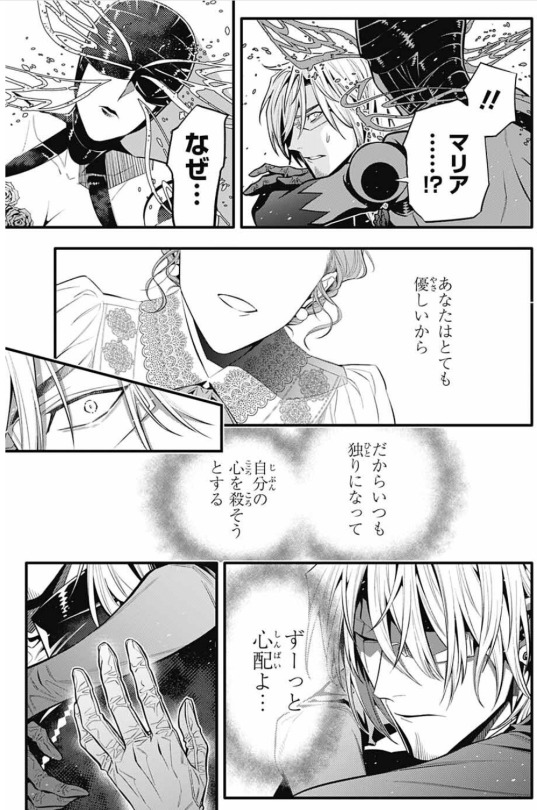
We've known for a while that Maria is a corpse, but now we know who it was. It's also interesting that he calls her 聖母 (Mary, Maria, Holy Mother) because Caterina fits into all of these roles either literally or narratively.
Of course this is just a theory, but here are a couple reasons why we believe it's true:
1- Starting off with a slightly meta one, but the series has progressed too far for a brand new, important character to be introduced. It makes more sense that it's actually someone we're already familiar with.
Notice how we never get to see Cyrus, not even a silhouette.
2- .... These descriptions fit Cross quite well. We know he's quite skilled with magic, so that might have been what caused the smoke there.
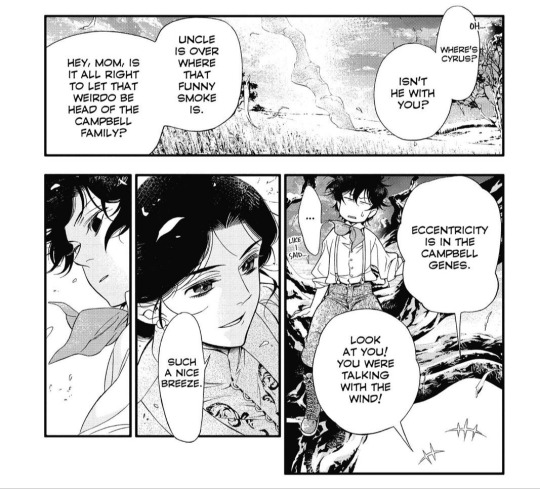
3- Nea claims to hate humans, but he considers working with Cross to be something unavoidable.

Assuming past Allen was a bookman, Cross is the only human Nea's acquainted with. An easy explanation would be that they're family members, but there are other ways to interpret this. Still, Nea clearly doesn't hold either in high regard, so.....
4- This exchange from Komui's Discussion Corner:

there's no real reason to hide his age since we've already seen him in the past, but giving an accurate number might give away how old he was when the betrayal happened.
5- Cross claims to have made Timcanpy, and holds onto the only thing capable of killing it, the thorn of Cornelia.
6- everything leads us to believe Cross was involved in the Campbells' past, but how come he's never mentioned in any flashback, let alone seen? The simplest explanation would be that he's using a different name.
7- Cyrus and Cross are similar names aren't they. Sort of. Guy's not even creative
#ven speaks#dgm#d gray man#dgm spoilers#dgm theorycrafting#i realize this reads like a conspiracy theory but it just makes too much sense#i probably didnt do a great job explaining so if you have any questions do tell#couldve also talked about his mask and the possibility of an actual cross being under it#like its a crystal type considering he has two innocences and wont explain anything#nothing comprehensible comes to mind though#moral of the story is there's no such thing as a joke in dgm theories
221 notes
·
View notes
Text
Good Omens S2 Ending Theories: an analysis.
ok so in the aftermath of good omens s2 lots of theories have risen about Aziraphales choices and his out of character behaivour.
i will be discussing my takes on the following theories:
The Coffee theory + book of life theory
The Lie theory
Religious Trauma theory
The Last Resort theory (my own theory)
(Please feel free to make any corrections if i get any information wrong)
Starting with the coffee theory:
(i may be wrong here, this is what i have heard, i am still currently reading "the magic trick you didn't see" essay) the coffee theory :
This theory basically goes off the idea that The Metatron has laced the coffee with some sort of poison or miracle so that Aziraphale would be compliment with him and go back to heaven. there's another theory that sort of ties in with this, in that, The Metatron is meddling with the book of life.
what we know:
Poison affects celestial beings very differently than it does to humans (as seen in the flashback where Crowley chuggs a bottle of Laudanum, a very strong painkiller, which can be toxic if taken in large amounts. Usually, for humans, an overdose on Laudanum would result in a coma or loss of consciousness whereas, Crowley got high as a kite, shrunk, grew and went a little off his rocker.
The Coffe had Almond syrup
almonds symbolise Holiness and Purity
whether this a metaphor or The Metatron being evil, we cant know
he was extremely forceful in trying to get Azi to drink the coffee, as seen in the quote "are you going to drink it?"
his voice was welcoming yet there was a slight undertone of malice
when he orders the Coffee he asks for a dash of Almond Syrup, which is like very small amount but when he hands it to Aziraphale he says it has a "hefty jigger" of almond syrup, which is drastically larger than a "dash"
"do people ever ask for death" what kind of a questions is that? its so suspicous
we all know how good Neil is at adding the little details, so why else would he include the whole coffee scene and concept?
My thoughts:
i think the coffe theory could be a plausible explanation of the last events of ep6. Azira's behaviour was erratic and out of character. we ALL knew something was up when he said "Nothing lasts forever". this bitch has been wearing the same outfit for 100 years.
he also intially said he doesnt want to go back to hevean, but as he drunk more coffee he became more compliment with the idea of him leading the angels.
theres also something so deeply unsettling about the elevator scene. he's smiling, almost manically. Azira was NEVER power hungry, so him taking the job as supreme archangel, without another thought, doesn't make much sense.
i will probably add more to this but that's it for now.
The Lie theory:
the lie theory states that The Metatron never said that Crowley could become and angel again, and that Aziraphale made this up so that he would feel less guilty about leaving Crowley behind, because he knew that Crowley would never, under any circumstance, come back to hevean.
frankly, this theory makes no sense. if this was the case, Metatron's whole chunk of dialogue after Crowley leaves would be unnecessary and unjustified.
he says "how did he take it?" as if asking if Crowley was coming back
"he always did want to go his own way" implying that the offer of coming back to hevean did exist and that he just declined
"always asking damn fool questions too" talking about Crowley's fall from hevean
i, personally dont think the lie theory is a justifiable explanation for the s2 ending.
The Religous Trauma theory:
probably one of the most justifable theories, the religious trauma theory is that Aziraphale has been so brainwashed by thousands of years worth of manipulation from heaven, that he just cant see how toxic they are. he desperately wants to believe they can do good, and that he can lead the good. he wants to "fix" the system, when in reality, the system is working exactly how it was built and should be demolished, not fixed, because there's nothing to fix.
this makes a lot of sense, although it still doesn't explain the emphasis put on the coffee.
so
i present:
The Last Resort theory.
a theory of my own creation, the last resort theory is a sort of combination of the Coffee Theory and the Religious Trauma Theory. (Similar theories probably already exist but here's mine)
The Metatron knew that Azira would never leave Crowley, but he did know that Aziraphale would take the chance to "fix" heaven. he knew that manipulation alone wouldn't be enough, he's smart, and so had to add that extra cherry on top, a "class A, surreptitious half a miracle". in the last resort theory, Metatron has laced the coffee in some way to tip Aziraphale over the edge, because he knew that the offer of bringing him and Crowley back heaven would be almost enough to destroy humanity once and for all. The Metatron spiked the coffee as a last resort to tempt Aziraphale back upstairs and destroy the earth. he knows that if Azira stays with Crowley they will find a way to stop the second coming, which he cannot have happening, he needs for them to be separated for this to work. its obvious he hates Crowley, he gives him dirty looks and insults him after the confession, by bringing up one of the most painful experiences of his past, the fall. so he separates them, and that leaves us at our end.
Aziraphale smiling insanely in the elevator
and Crowley crying silently and internally in his Bentley.
what are everyone else theories?
#good omens#good omens 2 ending#good omens 2#fucking hate metatron#coffe theory#lie theory#religious trauma theory#good omens 2 ending theory#theories#good omens theories
18 notes
·
View notes
Text
an absolutely shocking number of people wanted me to talk about my thoughts on this post after i made it, lmao, so HERE WE GO, i'm gonna ramble in a very unstructured way about my dumbass theories regarding the development of… well actually a couple separate-but-linked subplots in MTMTE/LL. not about how they ended up, but about my theories as to what changed in the course of writing the comic and why.
specifically, what i have guessed might have changed in the development of rewind's subplot regarding finding agent 113 (dominus ambus in the final comic- we'll get to that below) and its overlap with the chromedome-prowl and DJD subplots.
big disclaimer: nothing i say here unless explicitly stated has been confirmed in any way by roberts, it's almost ALL wild theorising. i could easily be wrong about literally everything here, lmao, in fact i probably am! but ever since my second readthrough of the comic where my brain went 'wait, what was the motivation behind making rewind's dead husband minimus' brother when that connection never pays off??? roberts what???', combined with finding out that the cd-rw-prowl plot is one of the only ones confirmed to have dramatically changed from roberts' original plans, i have been. bizarrely obsessed with the whole mess of it. apologies in advance. but here we go.
first of all, the things that are confirmed, from jro directly:
the original plan for the chromedome-rewind-prowl stuff was that chromedome and prowl had been working together when chromedome met rewind; in this concept, prowl sent agent 113 to infiltrate the DJD and used chromedome as a plant at the relinquishment clinic to first shadowplay rewind into forgetting anything that could lead him to the truth, and then later to be a kind of 'minder' who followed rewind around and stop him finding out the truth. this is what prowl is referring to in the flashback scene prior to Overlord escaping where chromedome shadowplays him. the blackmail he was intended to be threatening to tell rewind there is that chromedome became his friend under prowl's orders, and false pretenses. the other major hint to this plan is the mention chromedome makes in issue #12 of rewind's supposed UV light allergy- this was originally chromedome making sure none of the marks were seen by medics. this plot is by word of god and the text of the comic itself a hundred percent gone in the final product. but it was not something roberts had committed to changing until AFTER the overlord arc, hence that infamous dangling thread that now has no clear explanation re: prowl's blackmail material.
relatedly, the original plan was for chromedome and rewind to just be friends for quite some time into roberts planning out the series' trajectory. even when actually writing the early issues, roberts was not sure if they would be romantic for a while, so he hedged his bets. (in the event hasbro said 'no' to his request to confirm cd/rw as married, he had a whole backup plan for tailgate and cyclonus.) in turn, it's generally assumed, though technically not confirmed, that e.g. this is also true of prowl and chromedome as partners, rewind and 113 as married, etc. it just logically follows. but yeah. all these original relationships were platonic or possibly, in one case, familial.
prior to writing the series, the first plan for agent 113/the person rewind was looking for was for him to be eject. it's not confirmed this was going to be eject as rewind's spark brother, but contextually, it seems pretty likely, since a) roberts has revisited the concept a few times, including with 113 once he's dominus, and b) the whole rewind/eject being near identitcal thing makes it an obvious approach- they're referred to in fan circles as 'twins' a lot the same as rumble and frenzy. at some point, late enough the notebooks covering "pre-production" outlines for MTMTE's first season do not mention him, Dominus Ambus becomes 113 instead.
so my big takeaway from thinking about this whole thing, to start off, is that the original plan probably involved agent 113 being vos. not the previous vos as we ended up with, but the vos we were introduced to as part of the DJD, the guy who turns into a sniper rifle and speaks in old cybertronian. there's some stuff early on when he's introduced that points to the idea that at the very least, the audience is supposed to consider this idea as plausible, namely:
agent 113 isn't first brought up in mtmte. he's first brought up as a mole the autobots have in the DJD in 'bullets', the prose story accompanying Last Stand of the Wreckers. first aid keeps an eye out for autobot badges on patients that have been shot because springer has told him that due to increasing paranoia about being caught as a spy, agent 113 insists on sending messages hidden in bullets shot at autobot soldiers, identifiable as his because they go very specifically through the right "eye" of his targets' autobrands. so 113 is a sniper/sharpshooter. and vos turns into a sniper rifle. one of the first times we see him is in a large spread where megatron is wielding him, in fact. this is then a significant plot point in mtmte later. (swerve and all that.)
vos has the quirk of only speaking "old cybertronian" that is unintelligble to many characters and the audience. the comic goes out of its way to make rewind knowing old cybertronian in mtmte a running gag early on (with the joke part being that he always gets the translation slightly wrong). not only is that a really specific link, but it feels totally plausible that the expected payoff is that only rewind recognises 113 when he speaks in old cybertronian, because he's heard it spoken before. (if 113 is originally eject, this makes a lot of sense; it relates to both of them being older than most of the cast, perhaps.)
dominus ambus is just. clearly not meant to be the pet as of when the pet and him are first designed in mtmte. lmao. and for that matter, minimus is clearly not designed to turn into a turbofox in his irreducible form. when we get the teeny tiny minimus reveal in RiL, it's really clear the idea is he looks very similar in both "forms"- same face, same colours, etc, but his irreducible form doesn't turn into anything. he has exposed ball joints like the internal 'skeletons' of TFs/toys and no kibble. the idea of 'he can't turn into anything, but he can wear armour to become whatever' is a pretty clear inference, right? (and was the dominant interpretation prior to the reveal dominus becomes a turbofox, ftr!) but to make dominus the pet, they have to design his internal form to look nothing like either his own armour OR minimus' internal form. that's… a pretty blatant retcon, imo! why is he a weird green colour when his armour is yellow? why does he have a fuckton of kibble and minimus is Nothing when in his irreducible form? retcon, baby.
so i really think that an early concept was that 113 was still an active spy in the DJD, and that this changed at some point, probably fairly early on but late enough the original seeds had been sown, with roberts doing a neat patch job to take the concept in another direction that still worked with his set up… but the question becomes WHY it changed. after all, none of the confirmed changes actually require altering that concept, so if i'm right, then why the hell would you change it?
my theory about why you'd have to change it relates to something else that has always confused me, which is where the really fun but kind of objectively batshit concept of 'rewind is making his new husband look for his dead husband he's still in love with, apparently has no idea why chromedome would be insecure about this' comes from. (it's great, i love it, but it doesn't strike me as an obvious storytelling beat to go for! it creates great storytelling opportunities because it's very… unintuitive for a love story, imo.)
which is that… they weren't originally married, which is kind of obvious in retrospect and ESPECIALLY now we know that 113 was originally eject! 'rewind doesn't realise chromedome might be insecure about his best friend looking for a guy from before they met he also cares for' is a way more obvious emotional beat when you think on it, imo! (plus it turning out to ACTUALLY be about chromedome's guilt because he knows where 113 is, ofc- there's the twist for the audience.) like. rewind thinking that is an ok thing to do with a friend is clearly the more intuitive plotline beat, versus 'rewind does this to his current husband who he is letting think he will replace'.
chromedome/rewind then winds up being romantic, and to match this, 113/rewind ALSO has to become romantic. right? otherwise, the then-still-a-misdirect of chromedome's jealousy makes no sense. why would chromedome be worried about a platonic friend replacing him as rewind's husband? so now, 113 is rewind's dead husband all of a sudden. (sidenote: this also makes the very bizarre backstory re: the wild power imbalance between dominus and rewind a lot more… understandable? if it was not envisioned as them getting married on the part of the author.)
maybe eject has already been replaced when this idea slots into place, or maybe dominus is conceived in part to allow for this element in a way that makes sense. you can't really tell in this theory. (in a similar way, puzzling out whether he's related to minimus because the idea was there for minimus to be a loadbearer and it created a way to make him 113 came first, or if it was the reverse, is hard to tell. ftr, when the magnus armour is referenced in the notebooks, it does NOT contain reference to minimus; magnus is just a small person who has been given augmented armour in those drafts.) (this has also always bugged me. WHY is rewind's dead husband also minimus' brother when the narrative doesn't do anything with that connection!!! wellll. that's one possibility. lmao.)
the original plan for chromedome to be in on it with prowl and 113- to have manipulated and lied to rewind, and for all of them to, essentially, have screwed him around- was changed by roberts because chromedome/rewind became romantic. he decided, imo completely rightly, that the subtext there with a romantic pairing was just wrong tonally and way too uncomfortable. you're getting into straight up gaslighting abuse, and for the first romantic couple of the series, and one of the first ever m/m pairings in TF, i mean… yeeeeah.
but this creates kind of a discrepency. because 113 is still fucking rewind over in this scenario. suddenly it goes from 'multiple friends of rewind turn out to have collectively been deceiving him' to 'both rewind's husbands have been deceiving him' to 'well rewind's NEW husband is completely innocent, he had nothing to worry about all along cause if they ever find dominus, he's the one who is a dick now' which like. that is not a satisfying conclusion to the conflicts set up wherein rewind proves that he is not so stuck in the past he won't choose chromedome over dominus if he has to, or where chromedome has to learn rewind really does unconditionally love him and he's not replaceable. right? it's a cheap get out of jail free card there.
and THAT'S why i would guess that if 113 was gonna be vos, it got changed. people have noted that dominus is easy to read as implicitly a bit of dick in mtmte when you think about it- he ran off without telling rewind, after all. but only when you think about it. this makes sense in the original concept. it doesn't really have a good option of payoff once chromedome is not nearly as bad himself. and in this theory, dominus doesn't so much get changed so he wasn't at all a dick about it, he just… gets moved out of focus with the "domestication" explanation. suddenly, instead of a potential confrontation between rewind, chromedome and 113 in dying of the light, to name one possible example, you have the revelation that dominus has been out of action this whole time, and now he can instead be a catalyst for a conclusion between chromedome and rewind. it's a little bit of sleight of hand. it means the audience isn't thinking about that in DotL. they're thinking about cd/rw, not dominus, even when he's right there. (a macguffin of a character til the end…)
and now you know the insane and completely unverifiable theory that has percolated in my brain to explain some of that whole plot's weirdness the past, oooh, 3 years or so. very good chance none of it's true but it's the best i have and it just drove me INSANE because i've reread everything relating to cdrw and minimus in mtmte SO much that the weird gaps nagged me constantly. this is what it's like being me. yes, it's annoying for me too. but for those who were wondering: here you go. 2200 words of this:
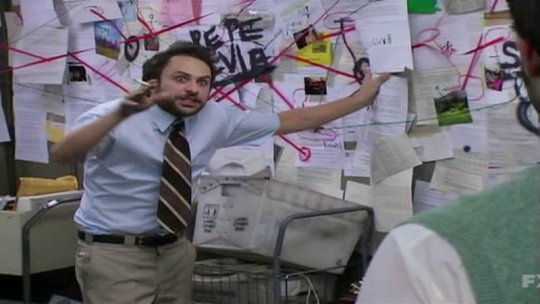
#meta#well. wild mass guessing bullshit anyway.#what else am i gonna tag it.#idw#rewind#dominus ambus#chromedome#cdrw
180 notes
·
View notes
Text
one key thing about fairytales of remnant is that it’s quite easy to discern which fairytales are ‘true’ in the sense of mythologizing real historical events; with the exception of ‘the two brothers’ such tales are noticeably more grounded than their pure-fictional counterparts, driven by interaction between human characters and only incidentally fantastical, and more crucially it is possible to connect the historical fairytales to specific periods of ozma’s or salem’s pasts without too much trouble. ‘the warrior in the woods’ harkens to salem’s miserable hermit era; the infinite man covers several of ozma’s lifetimes in between the end of the lost fable flashback and his life as the king of vale, likely after ‘the story of the seasons.’ ‘the indecisive king’ is vaguer because while it is clearly historical in nature it also does not seem to be about ozma; we can probably place it sometime before ozma managed to collect and conceal all four relics, but without a clear timeline for when that occurred in relation to scenes in the lost fable it’s tricky to get a meaningful sense of when. regardless, the point is that you can fit the historical fairytales together like pieces of a puzzle, using the context provided by rwby itself, to construct a loose timeline of remnant’s past.
this makes ‘the girl who fell through the world’ an anomaly. the story takes place in a fantastical other realm and is about a wholly unfamiliar new character named alyx. the narrative even loudly draws attention to this difference between ‘the girl who fell through the worlds’ and other fairytales that we know to be real, through the disbelief and (for weiss) exasperation with which team rwby responds to the ever after. they know of course that fairytales can be real, but not like this. hence why they continue to conceive of their present circumstances as ‘we fell into a fairytale’ rather than concluding that the fairytale must be a historical account.
the general assumption (mine included for a while) has always been that the repeated references to the story in V8 combined with the obvious fact of the ever after’s existence indicated that ‘the girl who fell through the world’ had to be true, a mythical account of events that really happened—but i think that poses a serious narrative problem for the sheer amount of explanation it would demand. why, nine volumes in and poised over the narrative turning point, would rwby suddenly and with minimal warning reveal an entirely new convolution of history with no obvious direct relevancy to the ozlem story? in order for a reveal of this scale to work, alyx would need to be closely connected to salem and/or ozma (one of their daughters, perhaps) and that poses its own set of problems because short of inventing someone new whose existence and impact hasn’t been hinted at prior, there simply are not a lot of candidates who fit that criteria—especially not if the ever after arc concerns salem rather than ozma, which effectively narrows the field down to “one of her daughters, Somehow.” this is, i want to be clear, Not Impossible to pull off but it is a rather complicated thing to do at a time in the narrative when you want to be focusing on introspection and emotional growth rather than historical exposition.
the simpler possibility is that ‘the girl who fell through the world’ is, in fact, fictional. that it has no basis in actual historical events. that alyx isn’t and never was real.
ozma uses fairytales to make sense of his past; this has created, in the audience, an expectation that any narratively important fairytale must correlate literally to some moment in history—but there is no reason to presume that principle will hold true for fairytales that weren’t written by ozma. perhaps the question we should be asking is not “who is alyx and what happened to her?” but rather “who wrote the story and why?”
considering ‘the girl who fell through the world’ from this angle sidesteps the narrative headache of historicity but raises an important question of its own: if the story is a work of fiction, how and why does the ever after exist?—but answering that question is quite a bit less complicated than integrating a historical alyx properly into the story and, crucially given when we are in the wider narrative, the answer is one we can figure out based on the information we already have—indeed it’s rather obvious—and in answering it we can identify with confidence the author of the story itself.
if ‘the girl who fell through the world’ is entirely fictional, then it follows that the ever after must have been created by the story. (if the ever after is real and the story’s author knew of it and set a fictional story there this wraps us back around to the historicity problem again and is also, i feel, unnecessarily convoluted.) the only reasonable way for this to have occurred is if someone with a lot of power, well beyond that of the maidens and even the divine relics, made it happen. the brother gods have that kind of power, but no reason whatsoever to bring to life the made-up setting of a human fairytale.
there is exactly ONE character who plausibly both could and would invent a fictional world—and that character is salem. consider that:
1 - the god of light made her immortal by submerging her in the “fountain of life and creation,” the heart of his domain, and this transformed her into “a being of infinite life” (and, one presumes, also of infinite creation).
2 - salem had children, which is to say that at one time she had four powerful motivations to be fabricating silly nonsense worlds out of thin air.
whether she deliberately created the ever after to entertain her daughters or simply brought it into being as a side effect of imagining it remains to be seen—both seem plausible but i am right now more inclined to think the latter—but in either case this origin would go along way toward explaining why the ever after is… the way it is, both in terms of the cultural importance of narrative role and ‘purpose’ (the ever after’s people are characters in the literal sense, with the limitations that implies) and things like the ever after’s ‘foundation’ being an empty white void (things that are not narratively relevant do not exist) or the apparently odd passage of time (stories do not experience time the same way reality does).
the more salient question of course is not how but why. both in the character sense (why did salem write this story?) and the narrative (why drop half the heroes into a fictional story written thousands of years ago by the hitherto big bad?).
broadly the point of V9 is largely to lay the groundwork for salem’s villain->hero arc and it accordingly needs to reveal some things about salem herself. thus:
if salem wrote the story then the story is fundamentally a reflection of salem herself, directly reversing the projection and presumption that has so far been utilized to keep her interior opaque; for the last eight volumes salem’s character has functioned as a mirror, reflecting back the desires and fears and beliefs of every other character who comes into contact with her, and the narrative point of view has now flipped such that we are sitting inside her psyche and looking out.
taken in this light, two things about the ever after immediately stand out: first that the ‘monster’ does not want to hurt anybody but is caught in a vicious cycle of relying on his fearsome appearance to protect himself from harm provoked by his fearsome appearance; and second that the ever after is willing to accept individual humans who fall into it yet also afraid and resentful of humankind. alyx “lies and cheats” her way through the ever after, causing trouble wherever she goes because she is ignorant of how the world works and apparently unwilling to learn for most of the story. alyx is also a lonely girl trying to survive a journey through an unfamiliar land, making friends and losing them again, learning to overcome her mistakes. the simmering resentment of humankind that bubbles out at the beginning of 9.3 is countered by the cat, who appears when ruby identifies herself as human and intervenes to rescue them from the red prince’s tantrum. there is this… tension between apprehension and affection, sympathy for both the frightened human and the persecuted monster, that locates the narrative of the ever after overtly inside salem’s point of view. when she first told this story, she had found acceptance and love after millions of years of isolation and rejection, and she has since then been rejected again, ostracized and buried in secrecy. those experiences map very intuitively into the ever after’s fraught relationship with humankind.
by the same token, the character of alyx potentially expresses some complicated and contradictory feelings salem might have about herself; it is difficult not to read alyx’s catastrophic journey through a world she doesn’t understand and which changes her beyond recognition to herself (“who had she become? would she still be the same back home?”) as at least metaphorically autobiographical, and of course there is her loneliness and melancholy contrasted against the villainous role alyx plays. again, it maps very intuitively onto the things salem has lived through as long as you do not take seriously jinn’s implication via ozpin’s narrative that salem has never once reflected on her own actions or tried to change in two hundred million years. (hint: all of one episode later rwby sets up a parallel ‘salem loses her temper’ scene where This Time nobody gets hurt because she sends everybody out of the room and even once she’s alone makes a serious effort to restrain her fury before she explodes.)
the utility to the narrative of exposing the interiority of salem’s character like this is self-evident—if this is how she perceives herself and her world, the emotional surface area for potential change is quite large. but even more interesting, i think, is what we have so far seen of how the ever after handles conflict: the hunting mice apologize and make amends once they learn that blake and weiss are not going to hurt them, we see jinxy ‘refunding’ the hug to the customer he cheated, the toy soldiers listen and readily compromise, the cat gently cautions the prince against hurting people in anger while empathizing with his pain (and the pain is very real—the prince is a young child who is expected to fulfill the purpose of his dead father and, lacking the experience or insight to understand that these strangers are much more fragile than himself or any of his subjects, he does not understand why they reacted this way. in his mind these people asked to play with him and then trashed his game and yelled at him on his birthday. of course he’s distraught he’s like four.)
the cat, especially, is interesting because they’re alyx’s guide through the ever after, and of course they intervene to assist team rwby as well. i do not think it’s coincidental that this role is played by a character whose purpose is to be curious. the key to the ever after is a cat who asks questions, who seeks to learn and understand rather than acting on first impressions. (notice too that the cat arrives when ruby identifies herself and her friends as human, but they don’t act until they’ve had time to observe and get a clearer sense of the situation.)
in other words the narrative of the ever after itself is shaping up to be a practical guidebook for HOW to negotiate a peaceful resolution with salem. this is actually true regardless of whether she wrote it or not, but if she did write the story, then her choice to structure the narrative this way says some interesting things about what she she might want and how receptive she might be to negotiation if approached in good faith (i.e. not what yang did in V8, which was a deliberate attempt to provoke her; yang’s goal was to divert salem’s rage away from oscar and she made a smart and very brave tactical call there. an effort to *reason* with salem would obviously look very different.)
the last piece i want to touch on is theme, because “storytellers have great power over their audiences” is the central thematic conceit of salem’s character—hence why the lost fable is framed explicitly as a fairytale, why ozpin explicitly identifies his rendition of ‘the girl in the tower’ as propaganda, and why the narrative has made such a particular point of establishing that nobody really knows who salem is or what she wants. she is, as noted, a mirror. if the ever after is a story and salem is its storyteller, then we have on the one hand a lot of stories other people tell about salem, all of which portray her as an unambiguous evil (including ‘the girl in the tower’ through ozpin’s commentary!)—and on the other a fictional story told by salem that is not about her, and insofar as she is indirectly represented by alyx she does not seem to be trying to exonerate herself. (it is also possible that alyx is instead an indirect representation of ozma, but that seems far less likely if only because salem would have begun telling this story at a time when they were still happily married.) this is congruent with salem’s behavior generally; she has never tried to explain or excuse herself and she notably didn’t argue or retaliate against the accusations yang made in V8, so in comparison to every other villain in the cast she seems to have shockingly little interest in rationalizing the things she does or even just correcting people’s misconceptions about her. within the context of the storyteller theme, salem surrendered control over the narrative long ago and seems reluctant to even try to speak in her own defense; if the ever after is her story and alyx a representation of how salem sees herself, then it seems likely that the reason for this reticence is grounded at least partly in a feeling that she does not deserve defending, and if alyx instead represents salem’s feelings about how other people treat her then the structure of the narrative and importance of the cat suggest a sense of helplessness because no one ever asks and a correlating desire to be asked; and because the ever after is a fictional story and the characters therein need not be directly literal it isn’t outrageous to think it might be both options at once.
46 notes
·
View notes